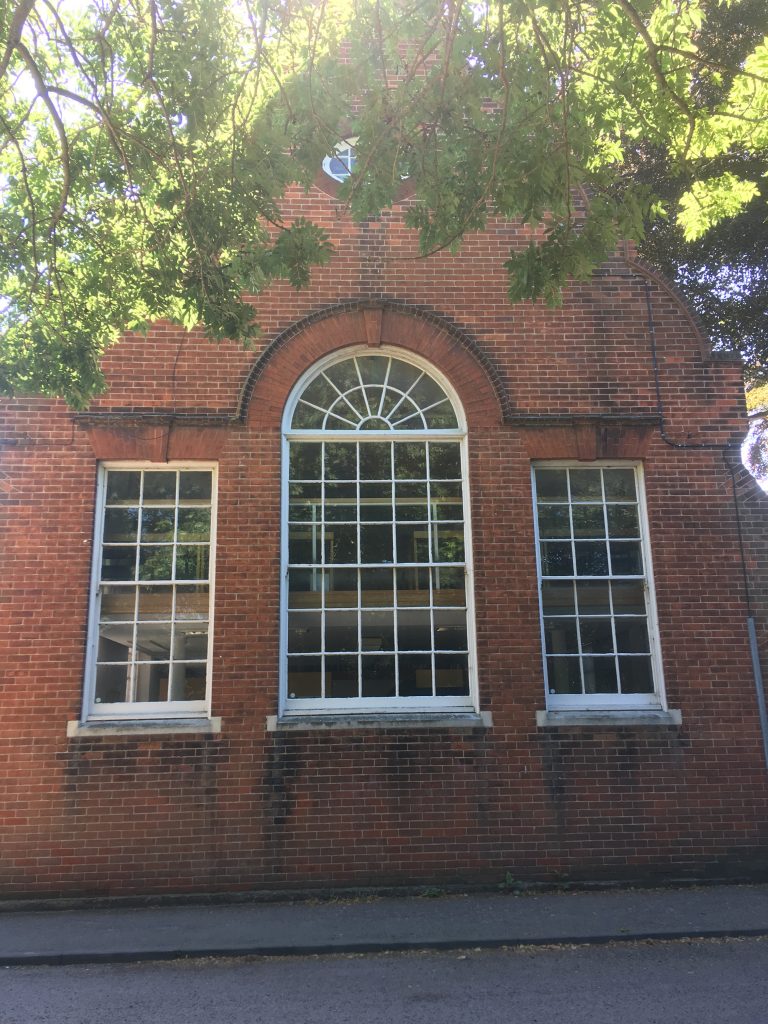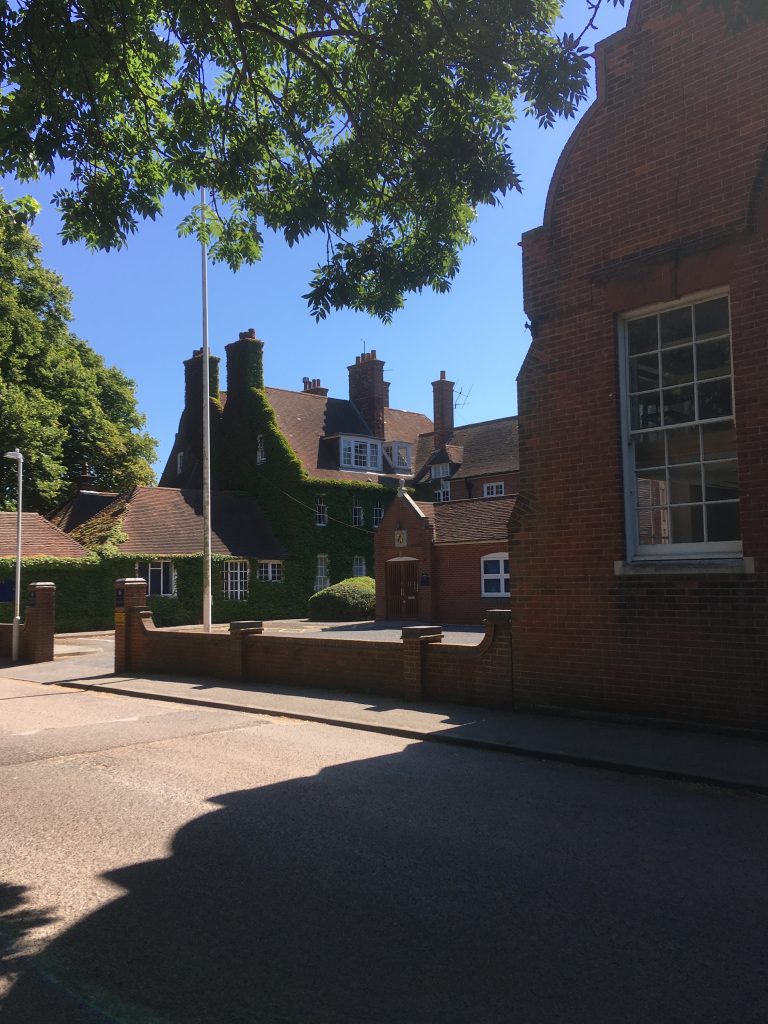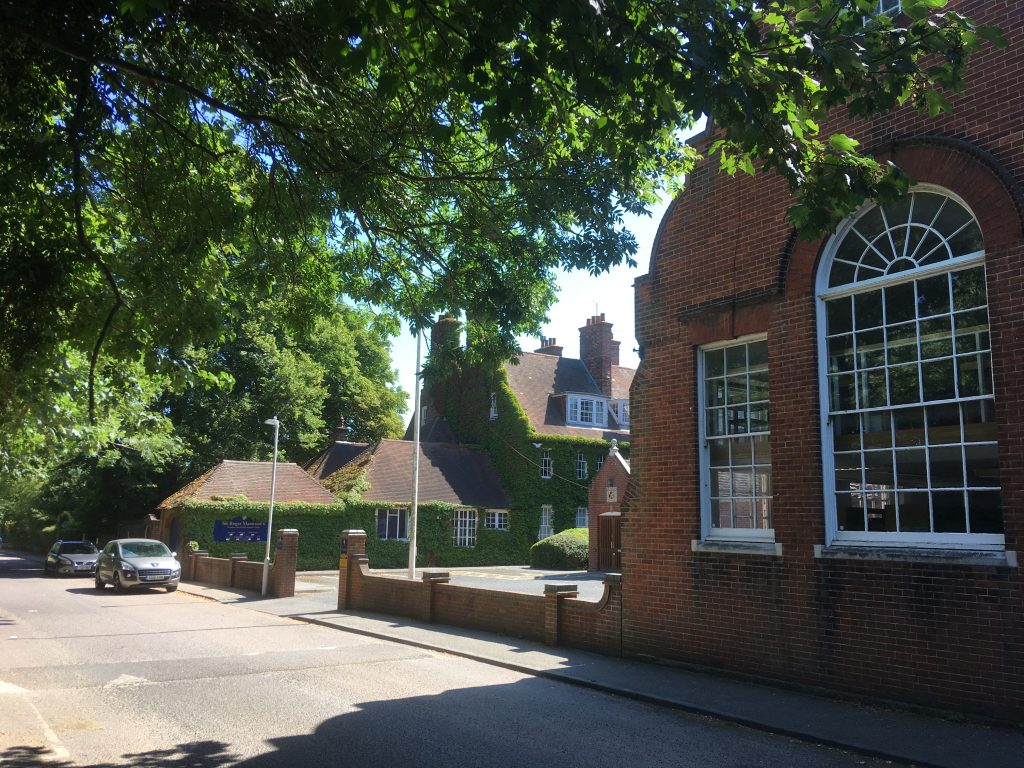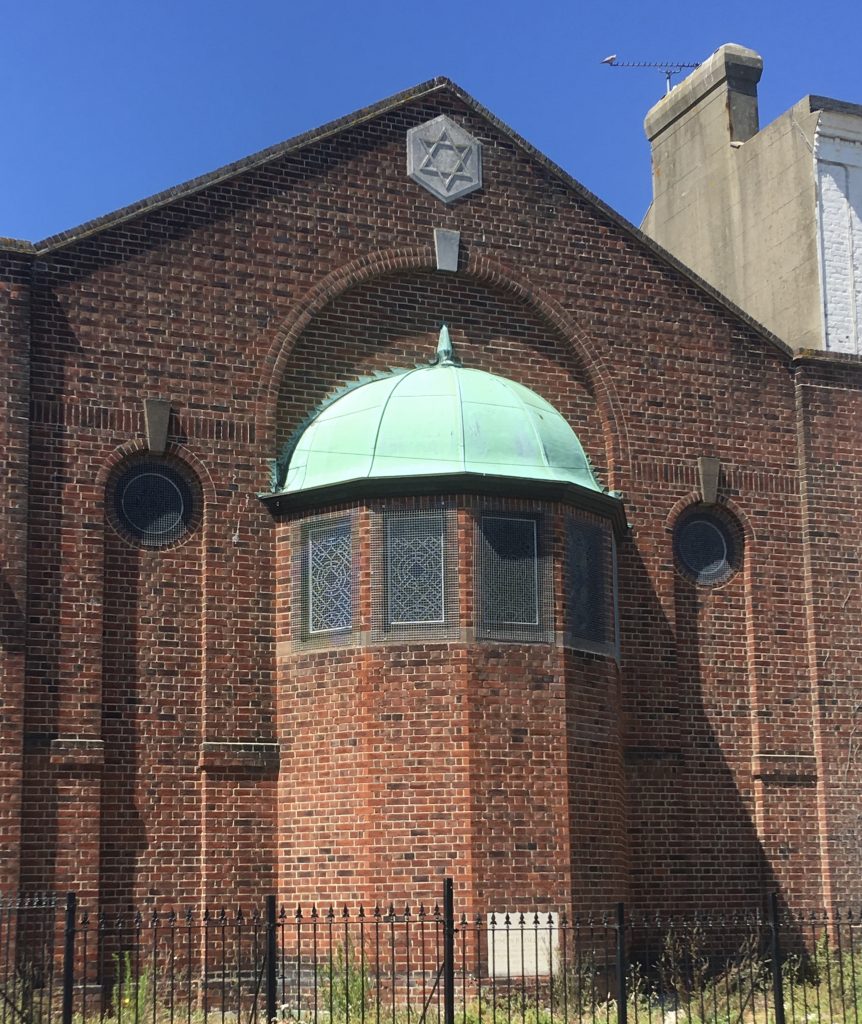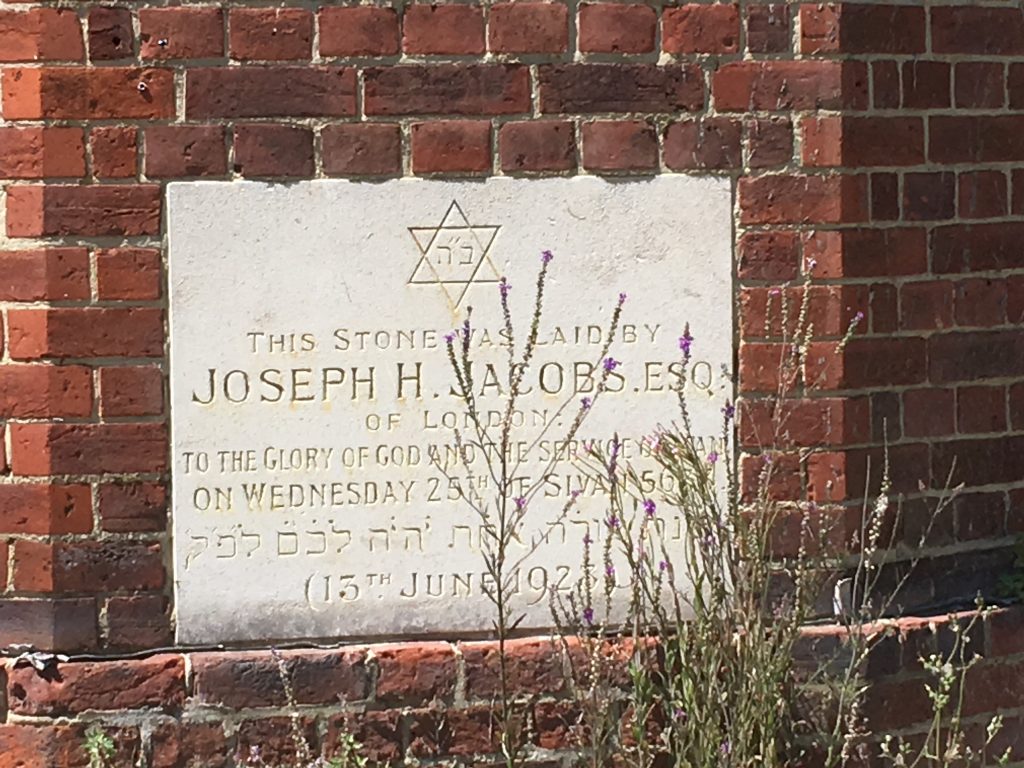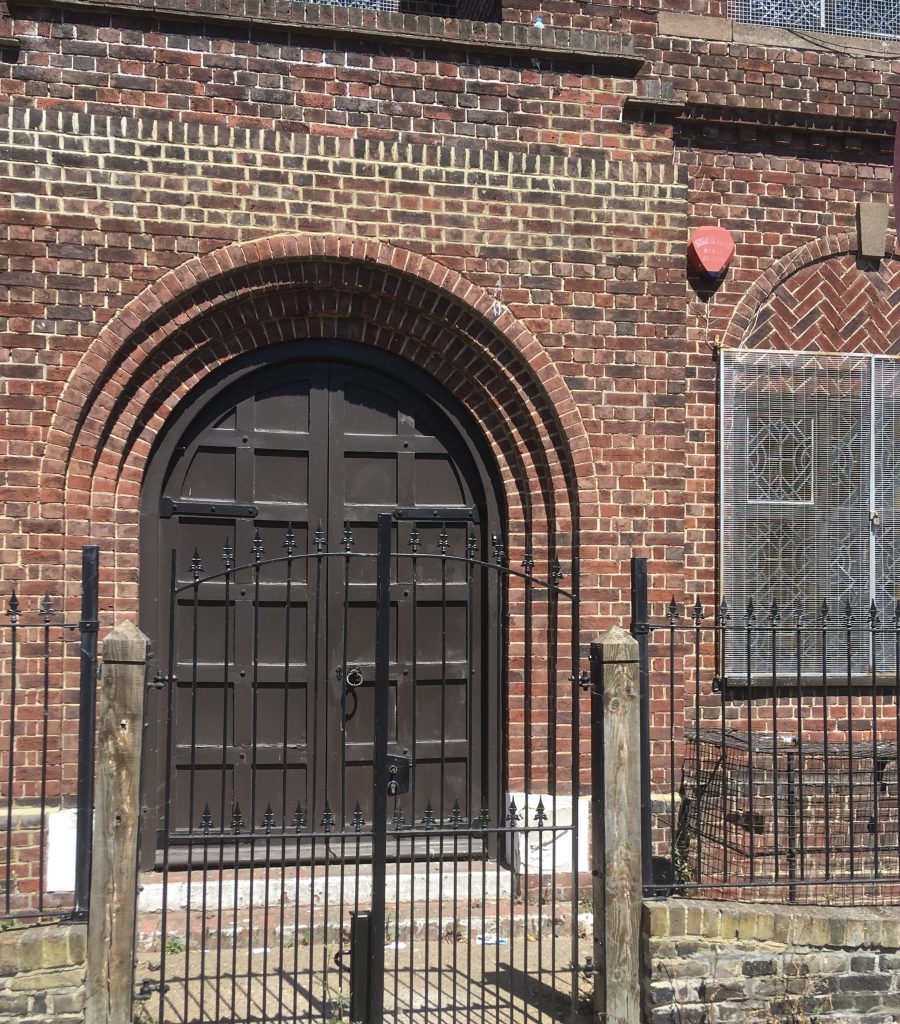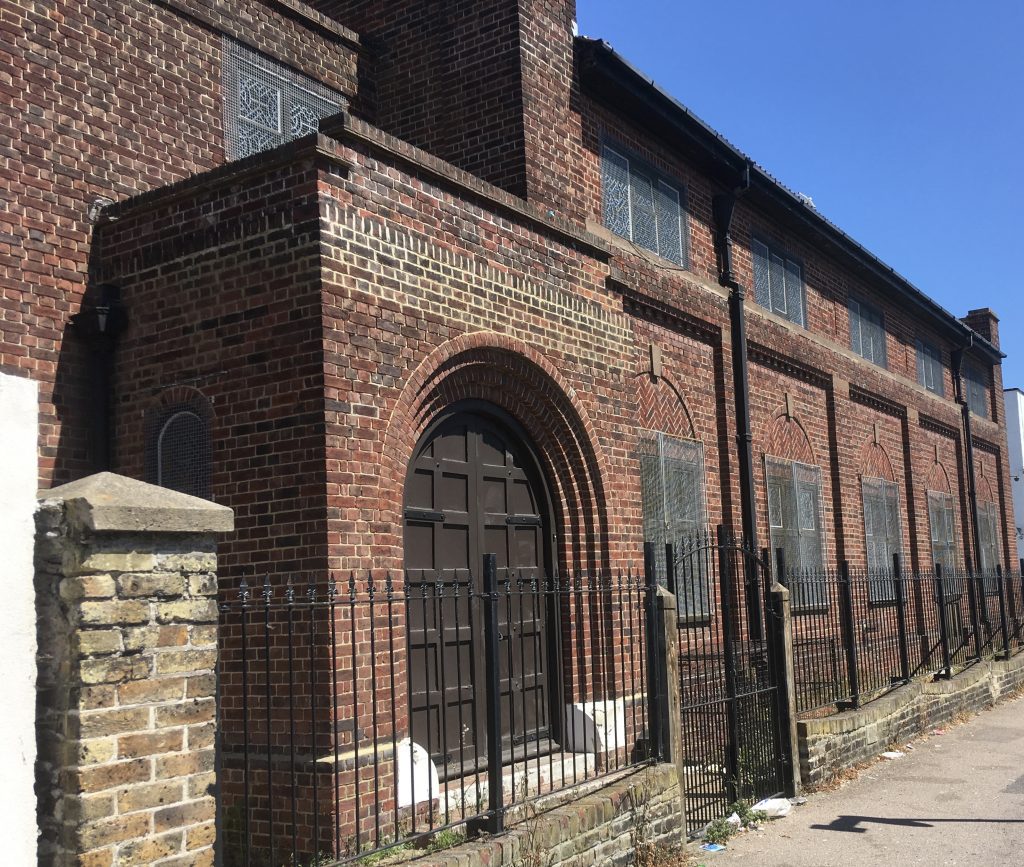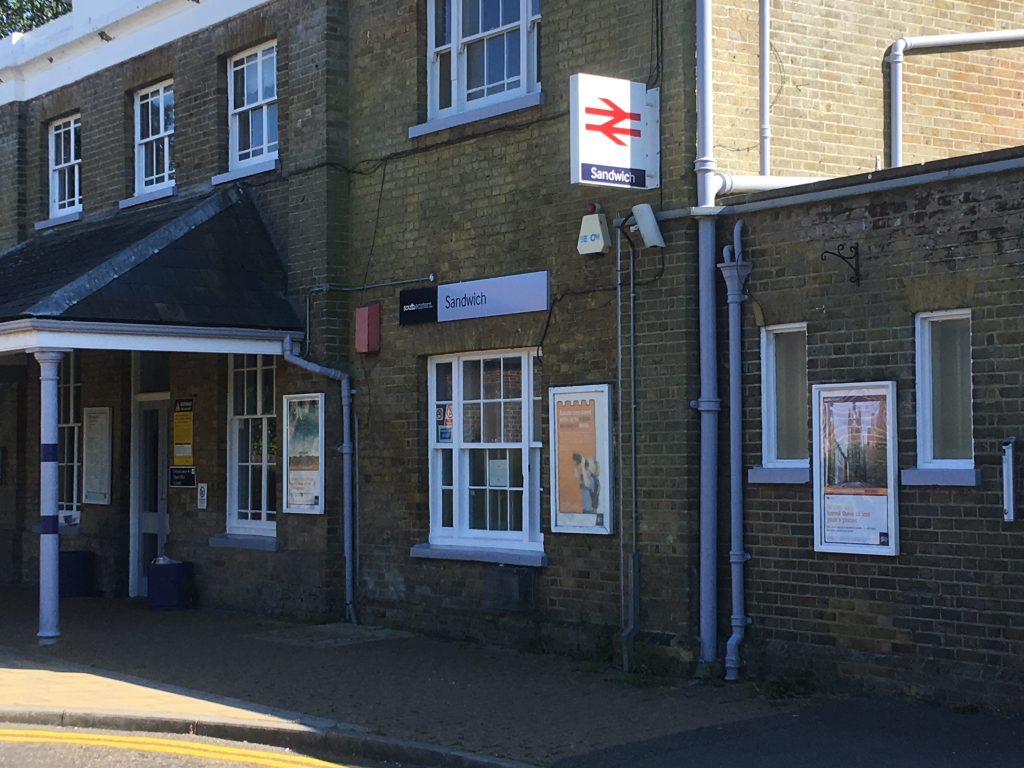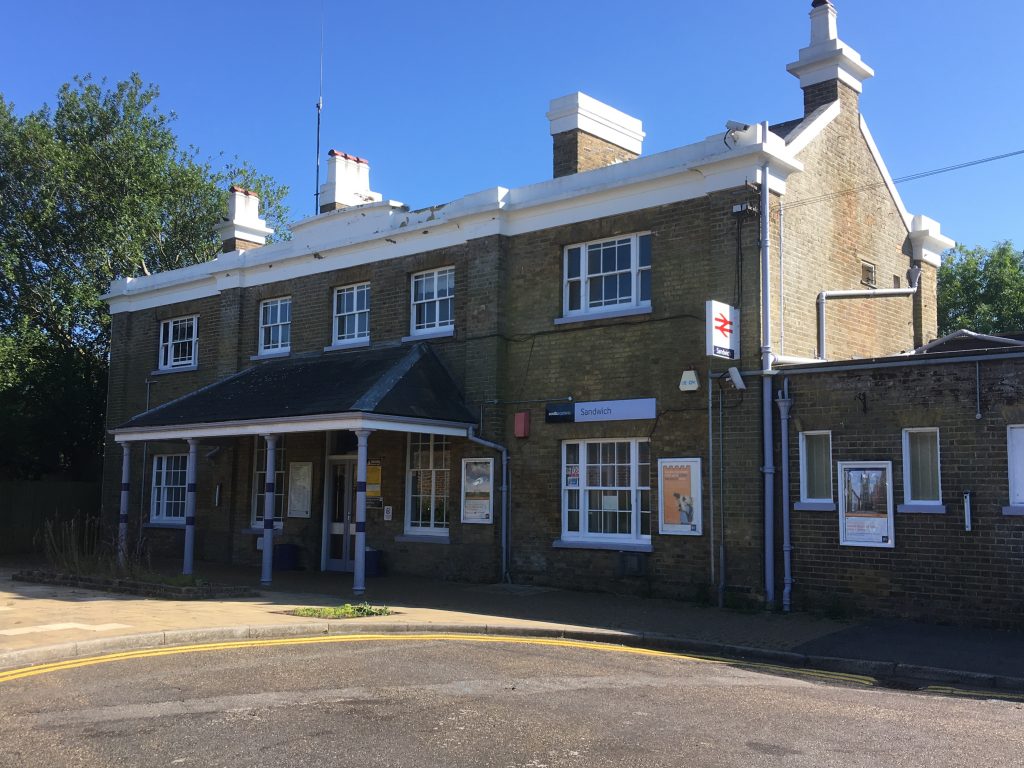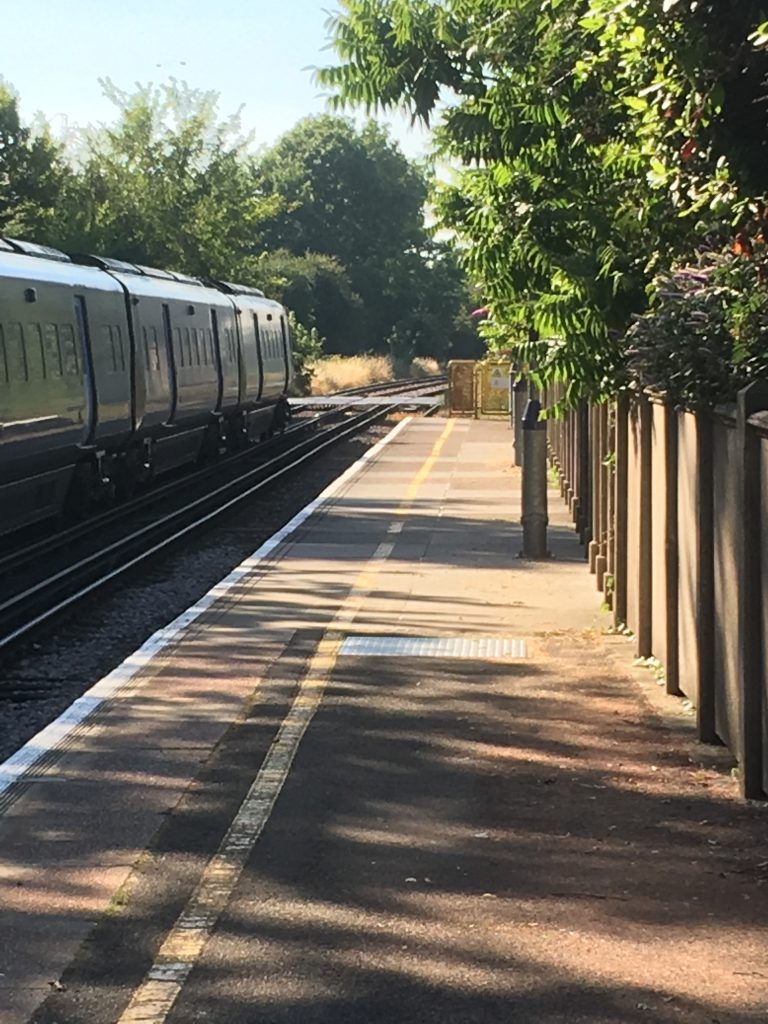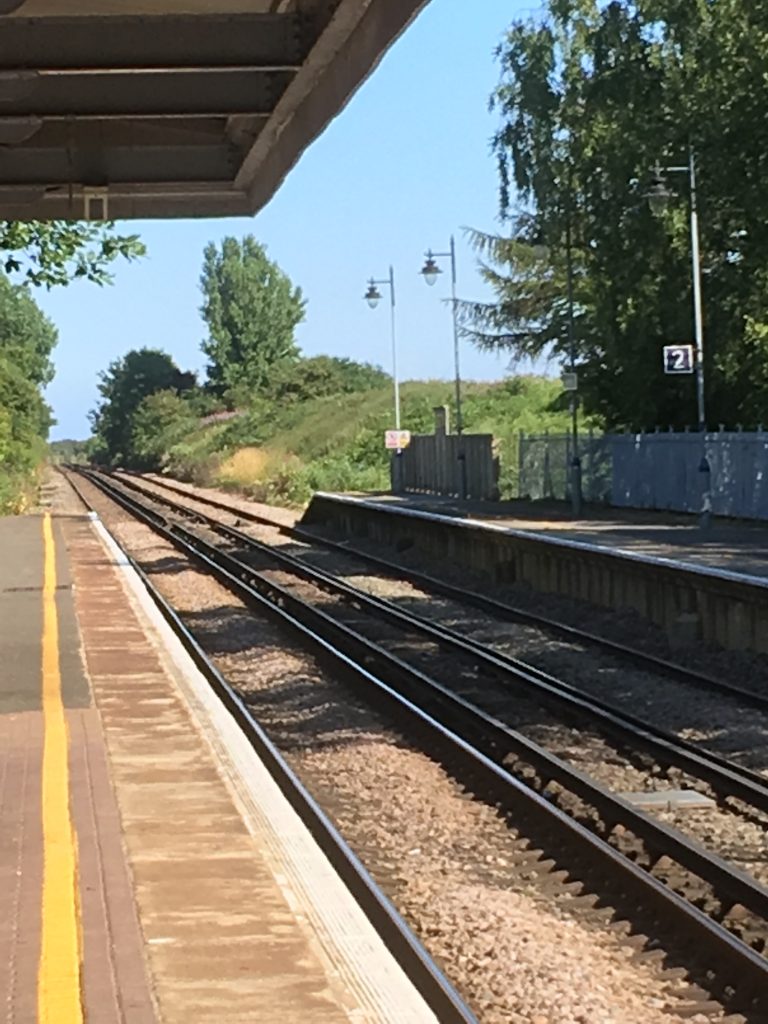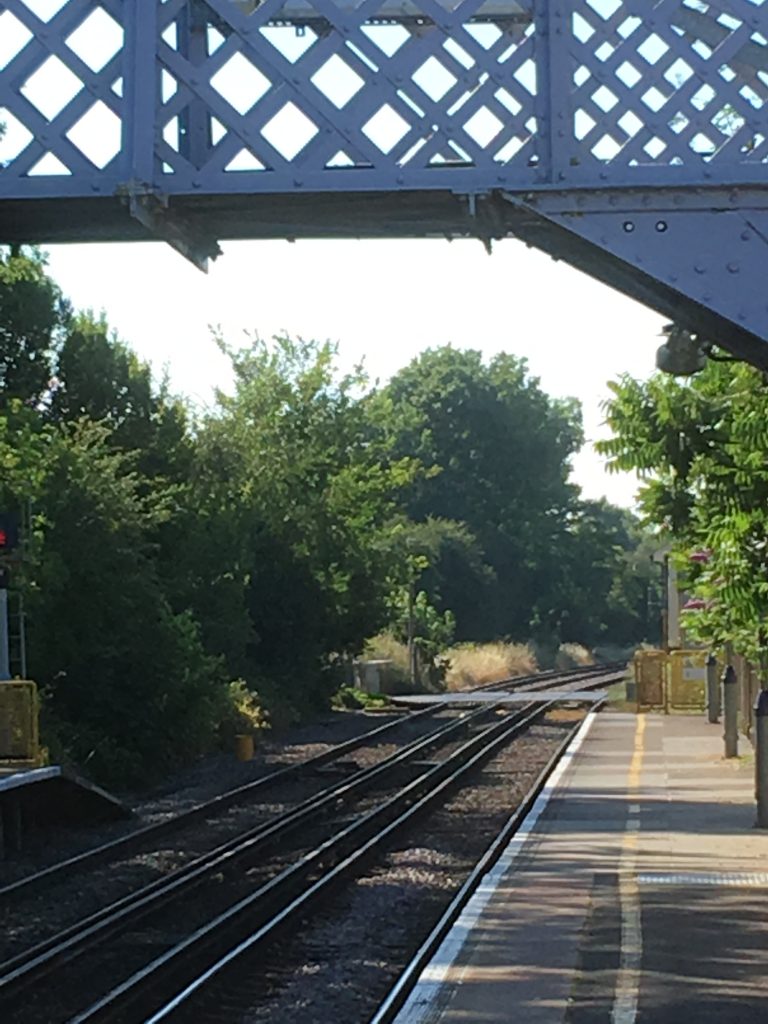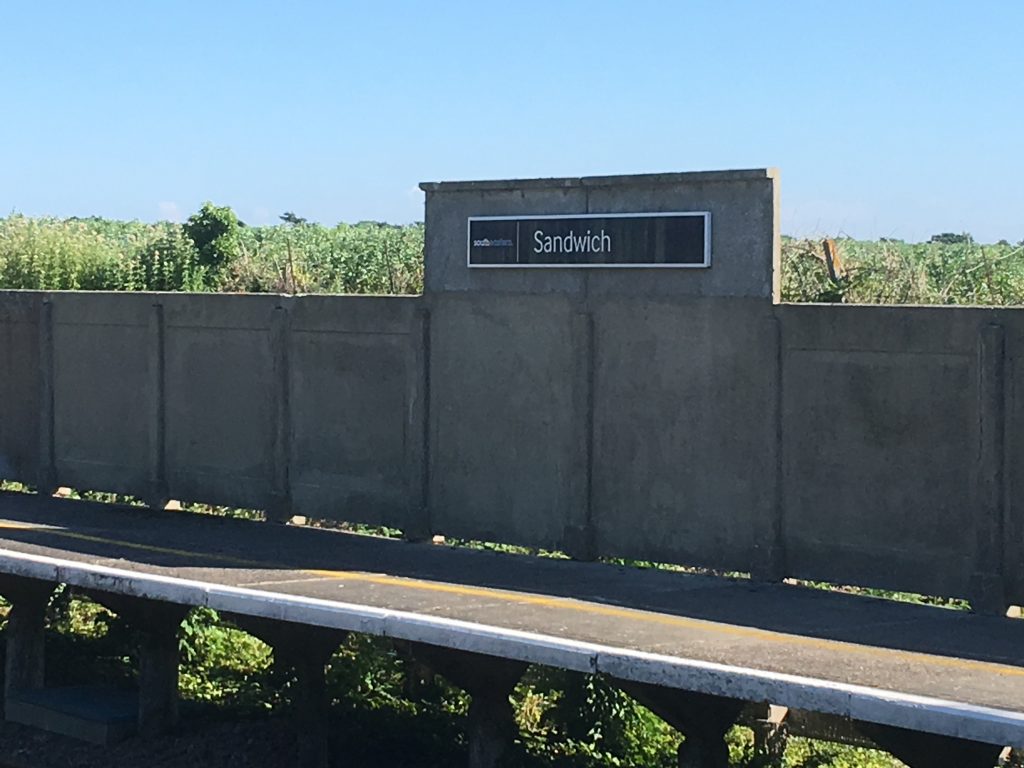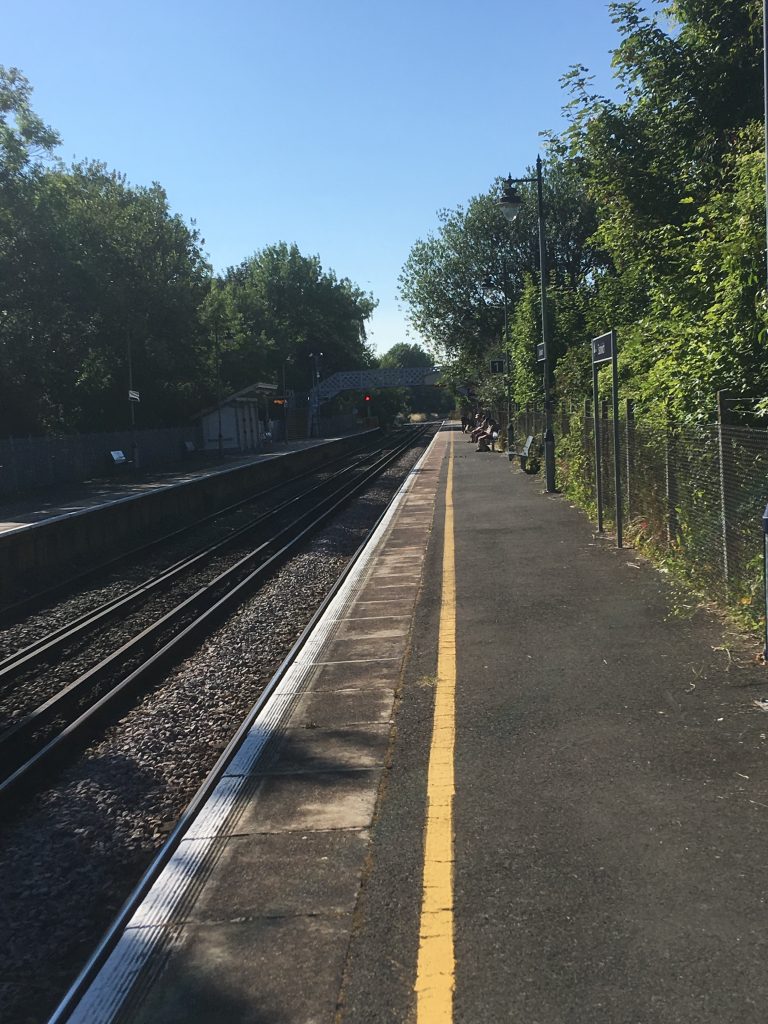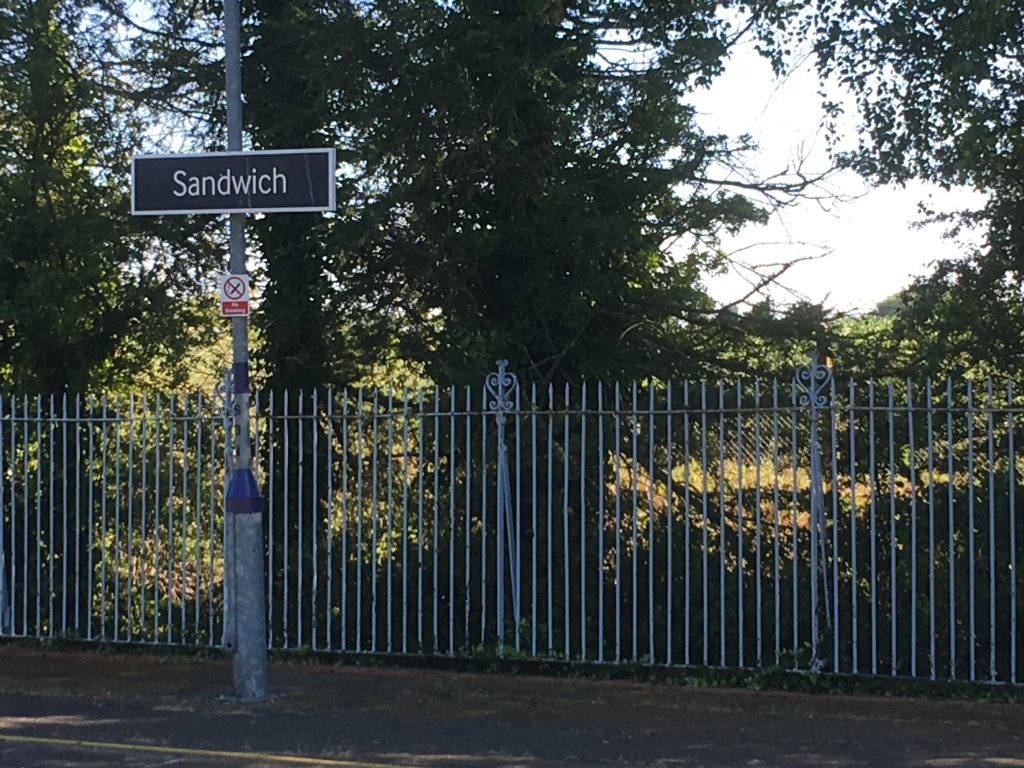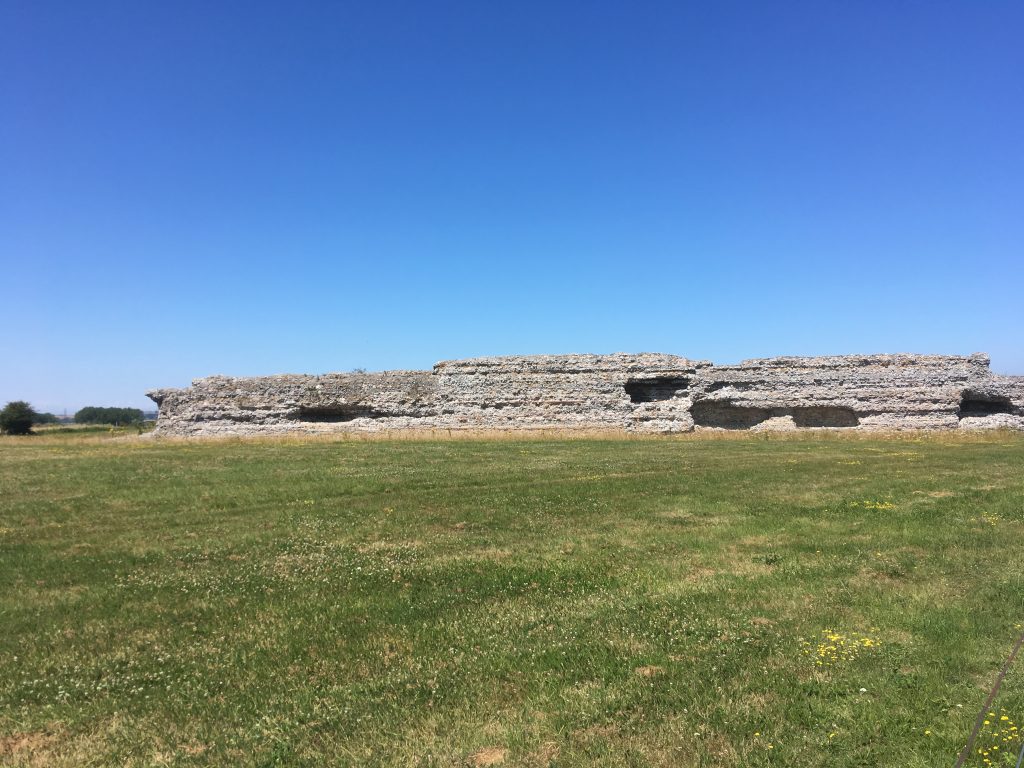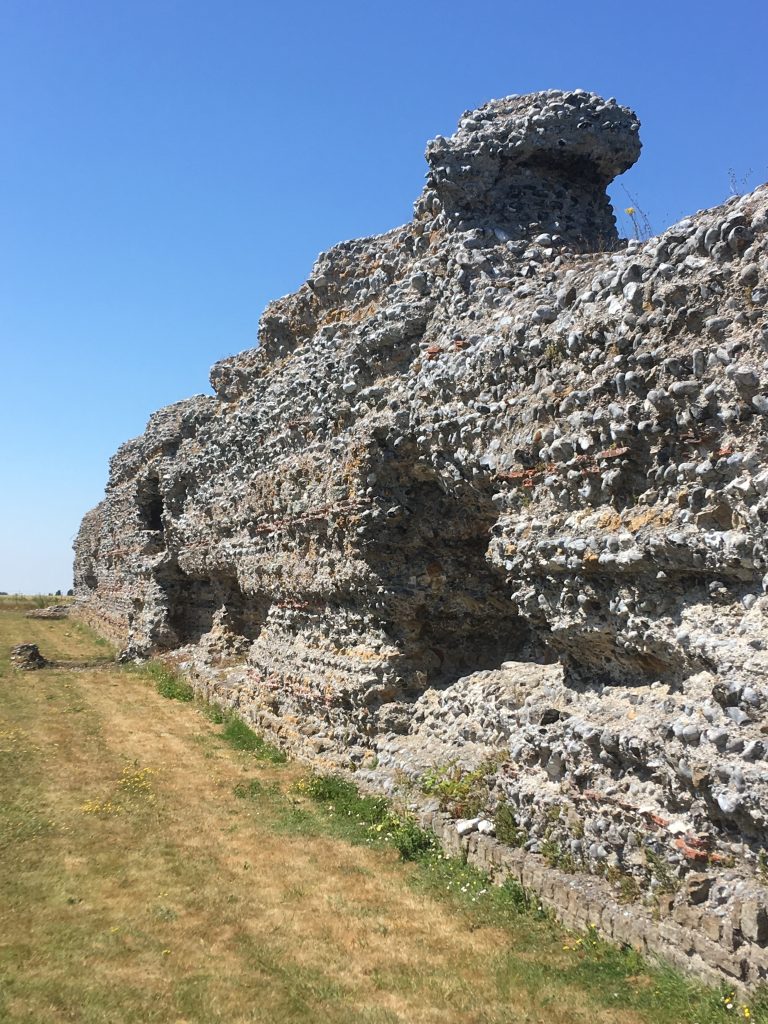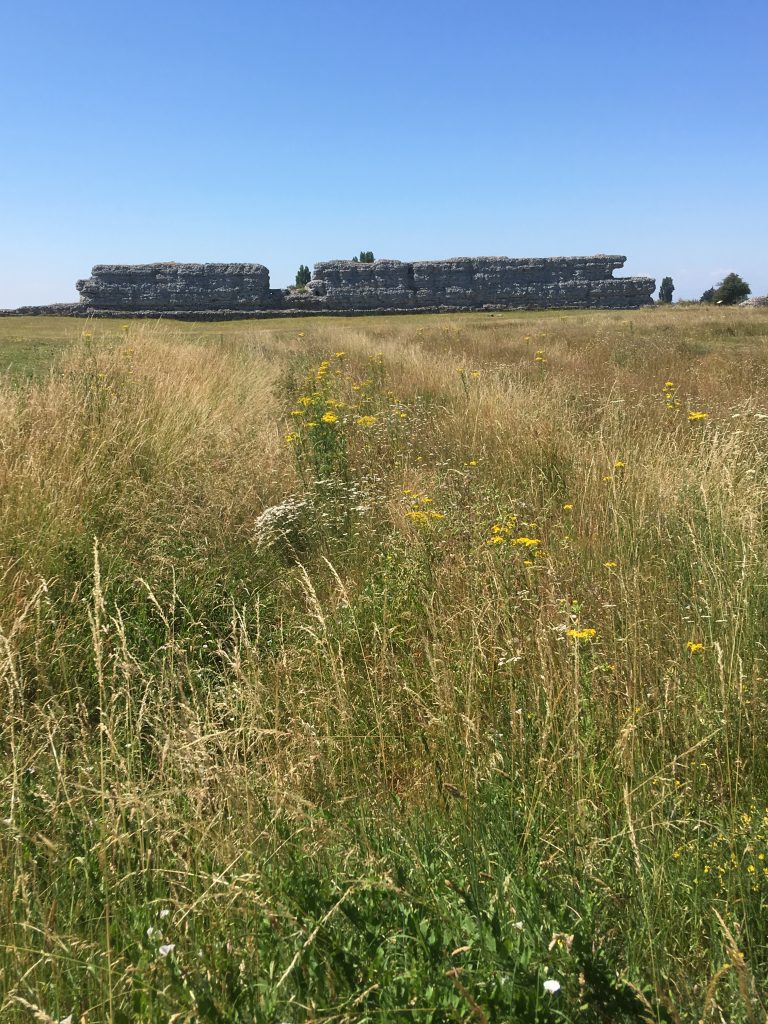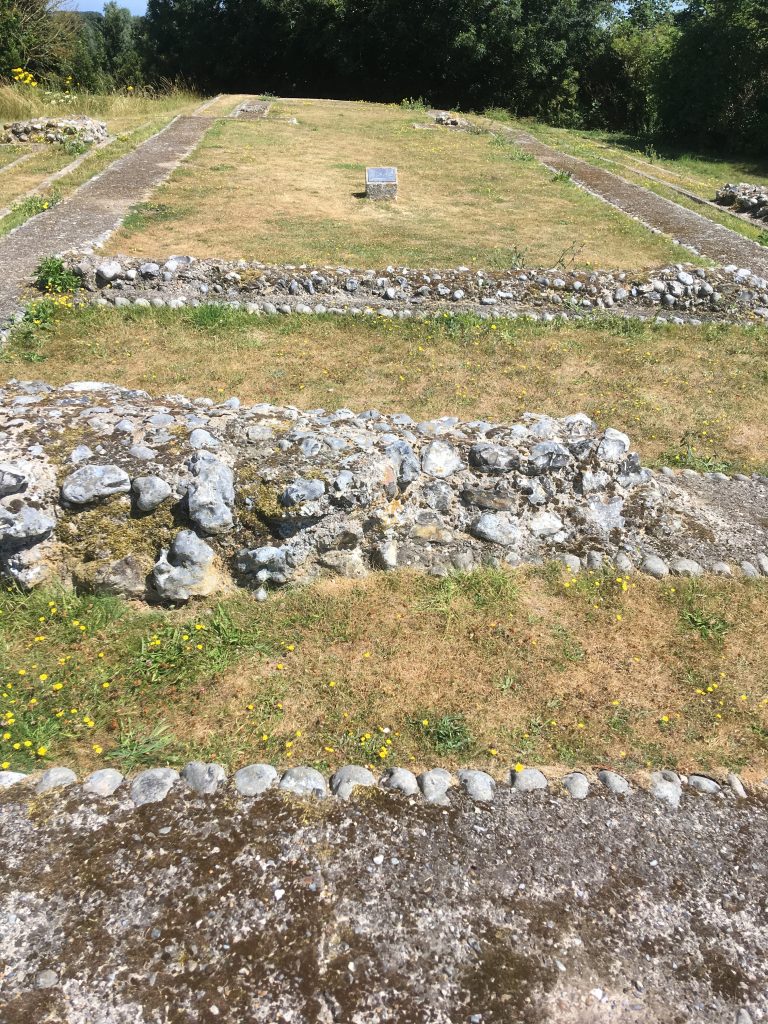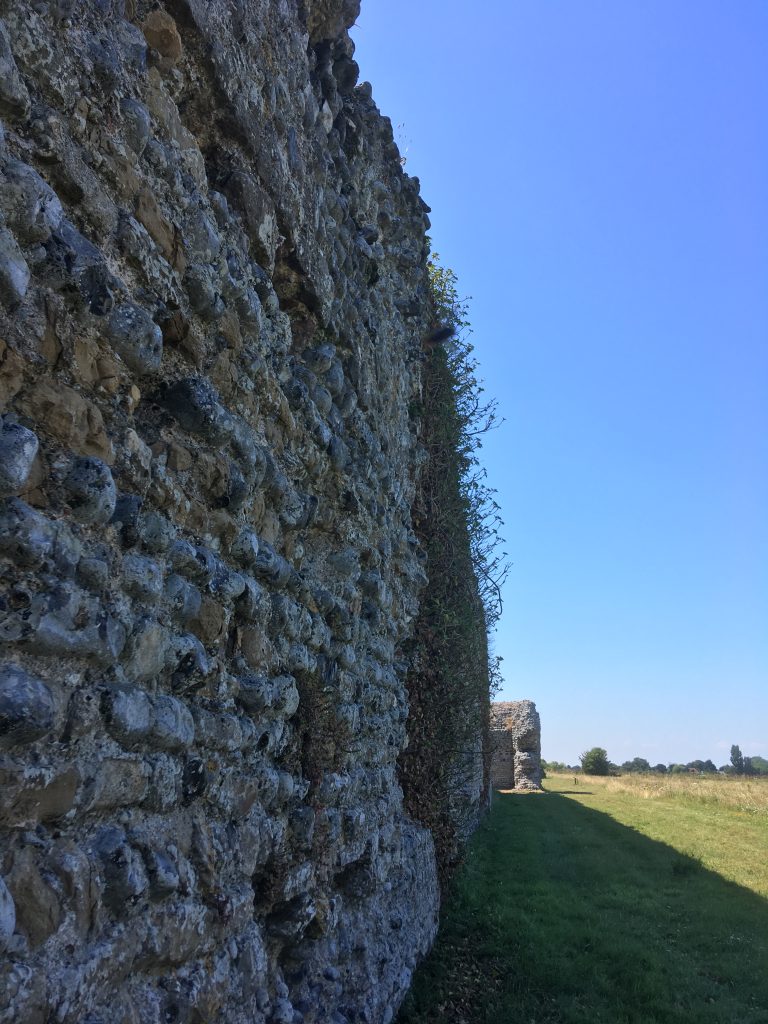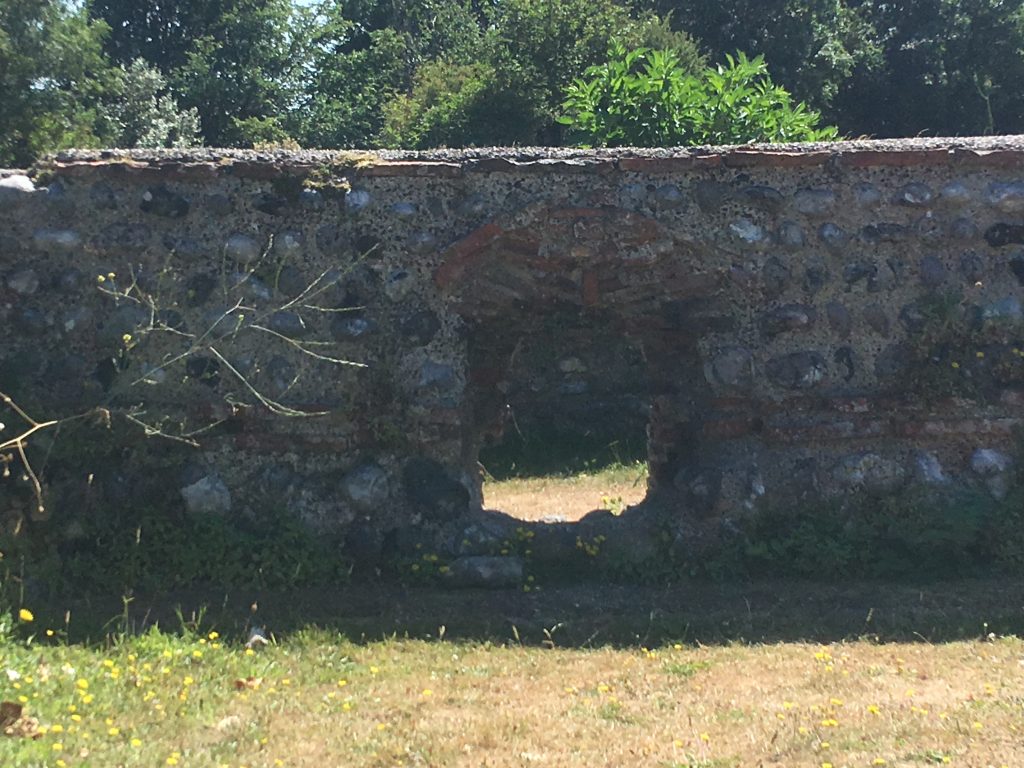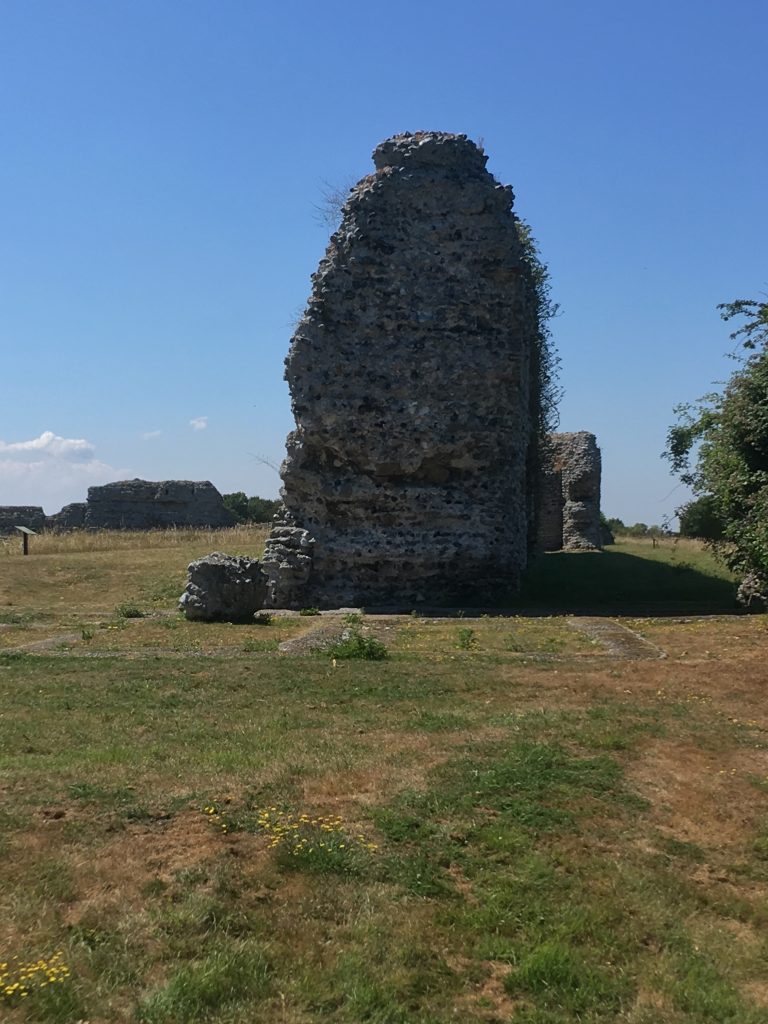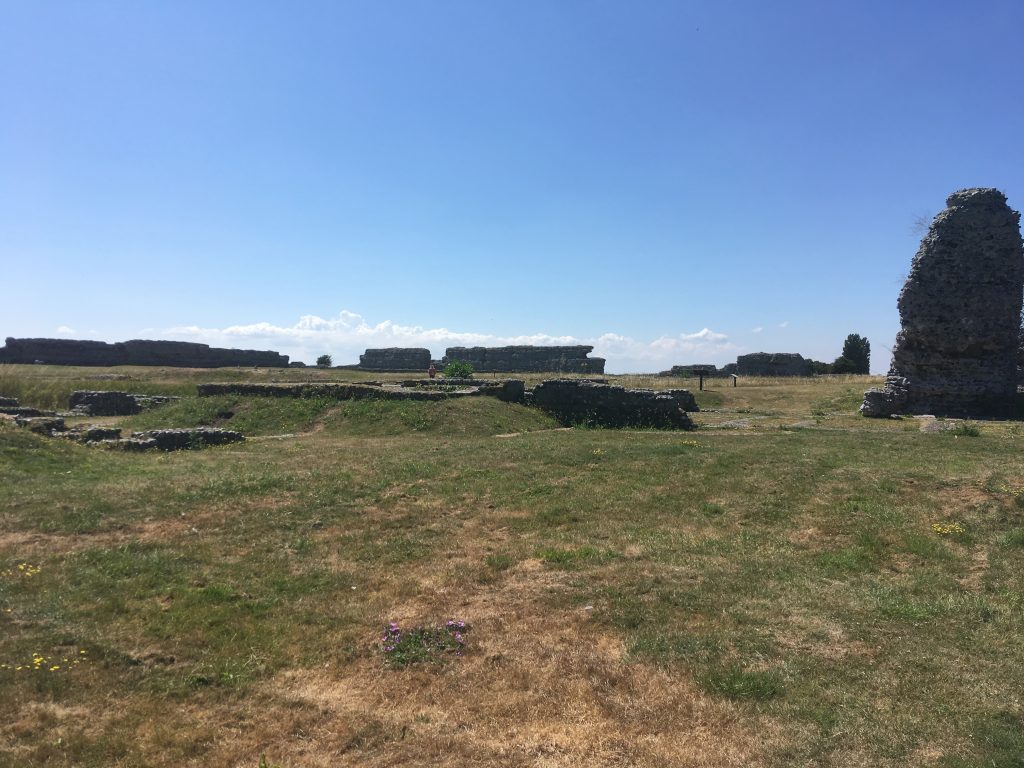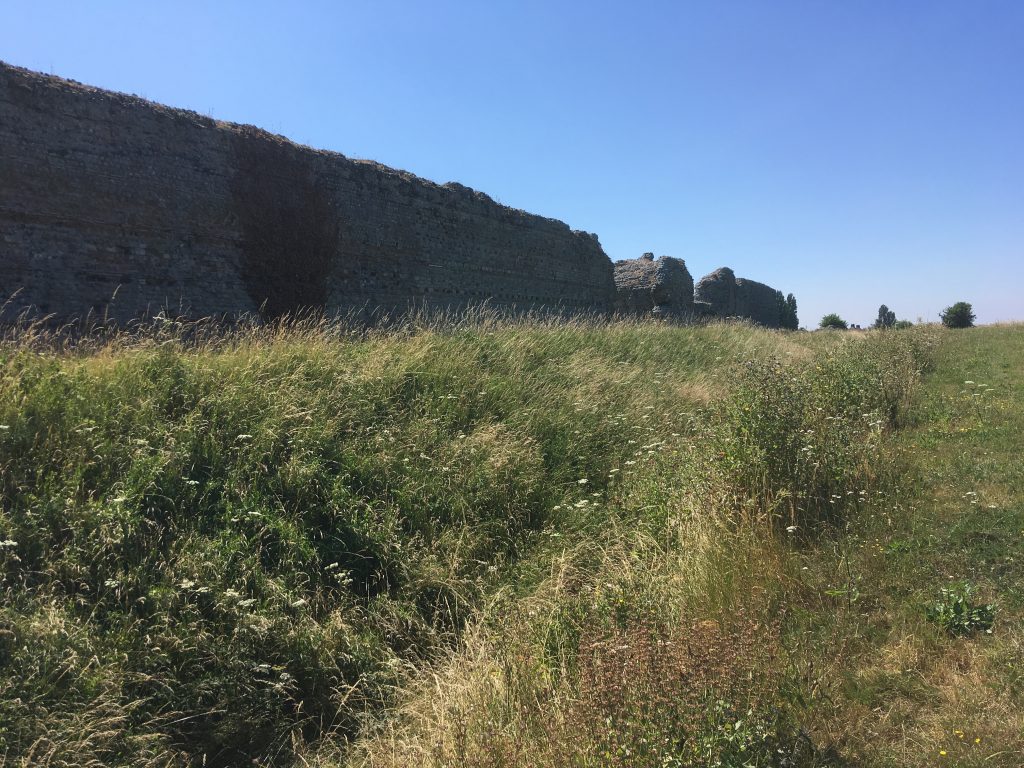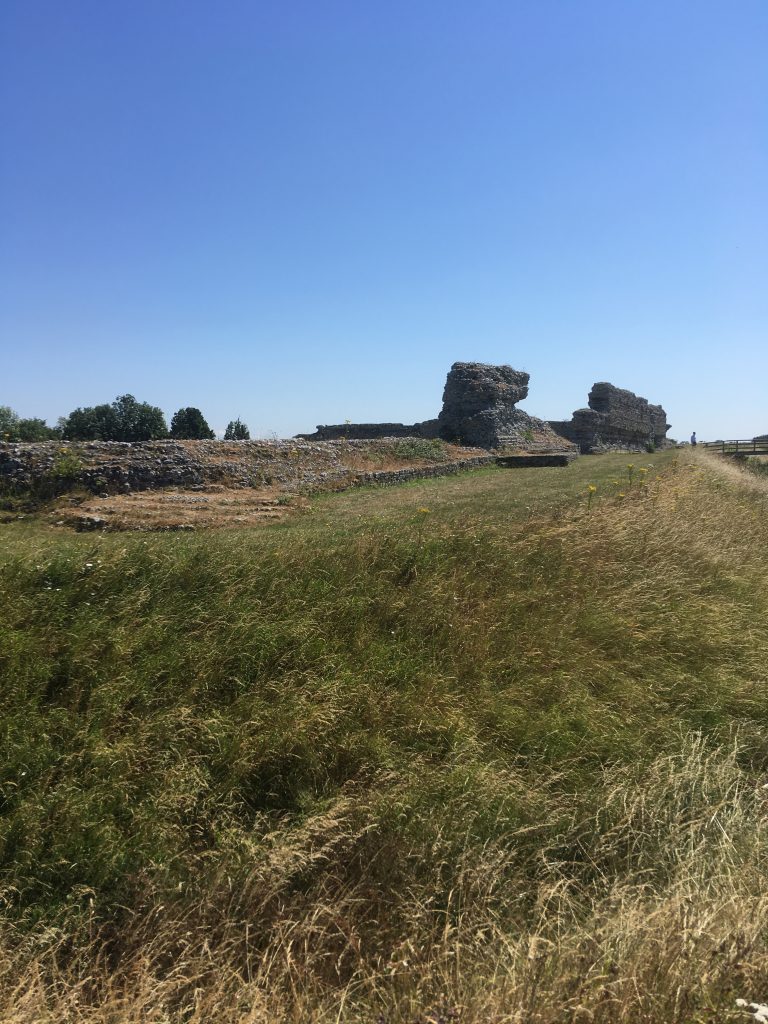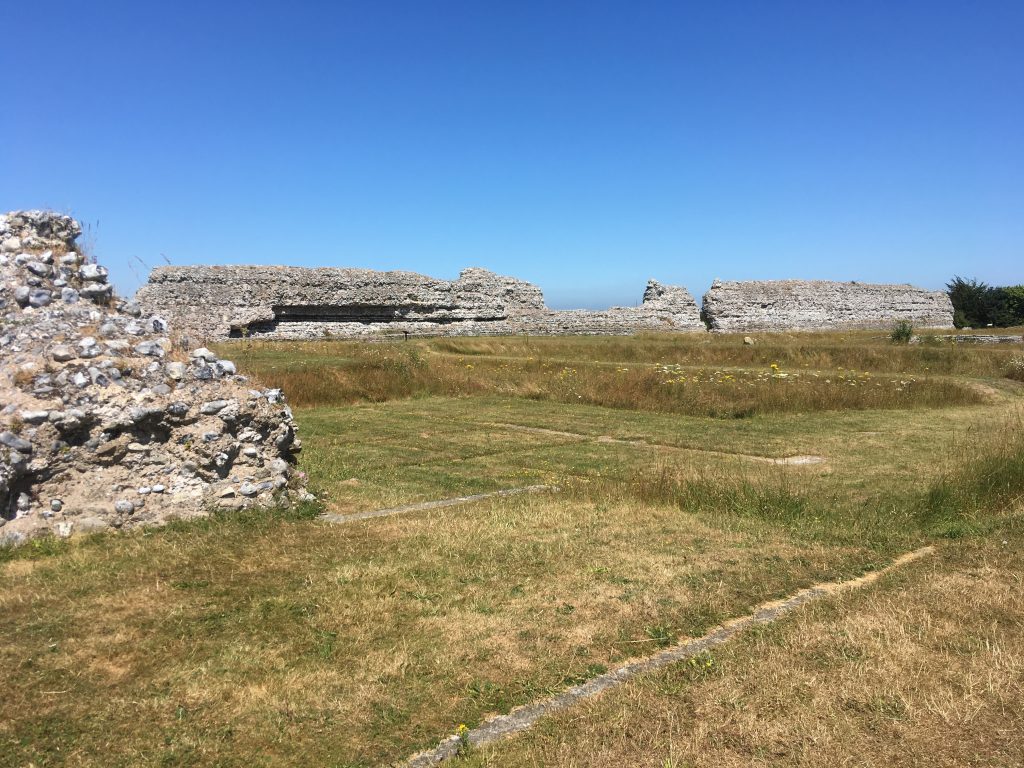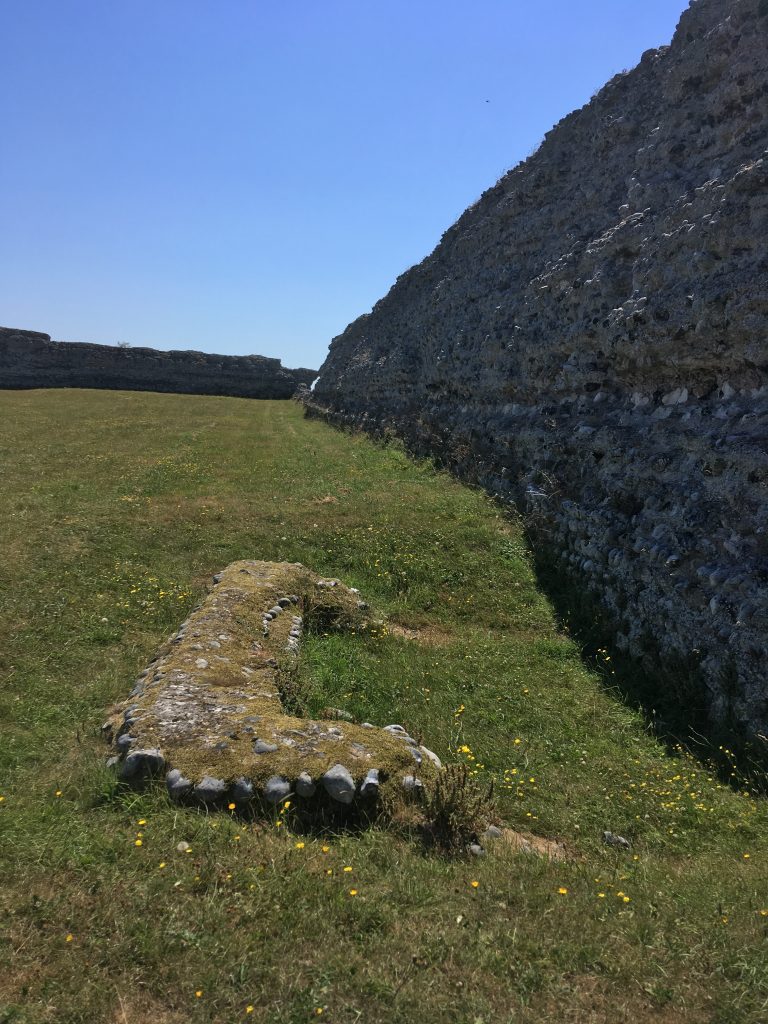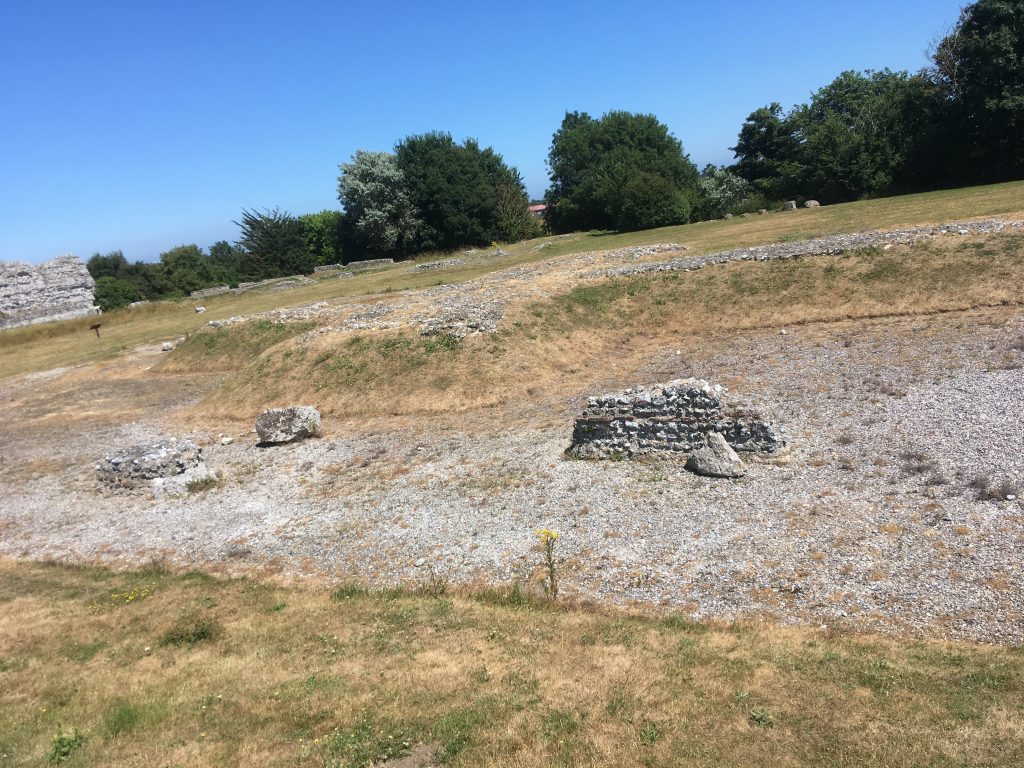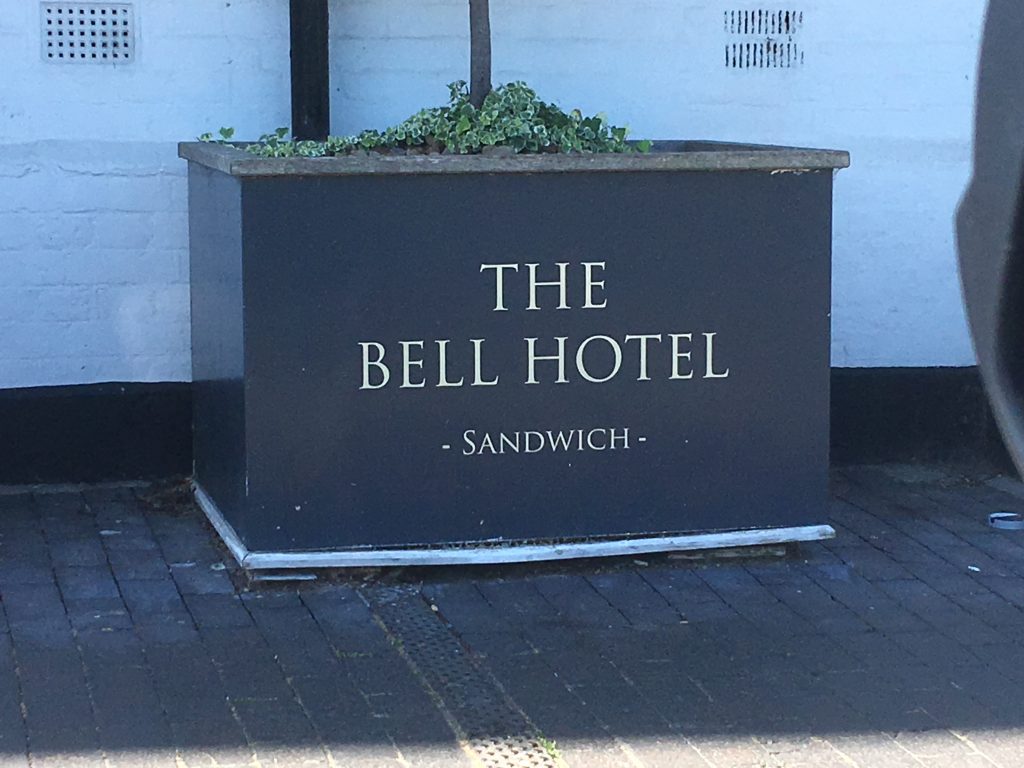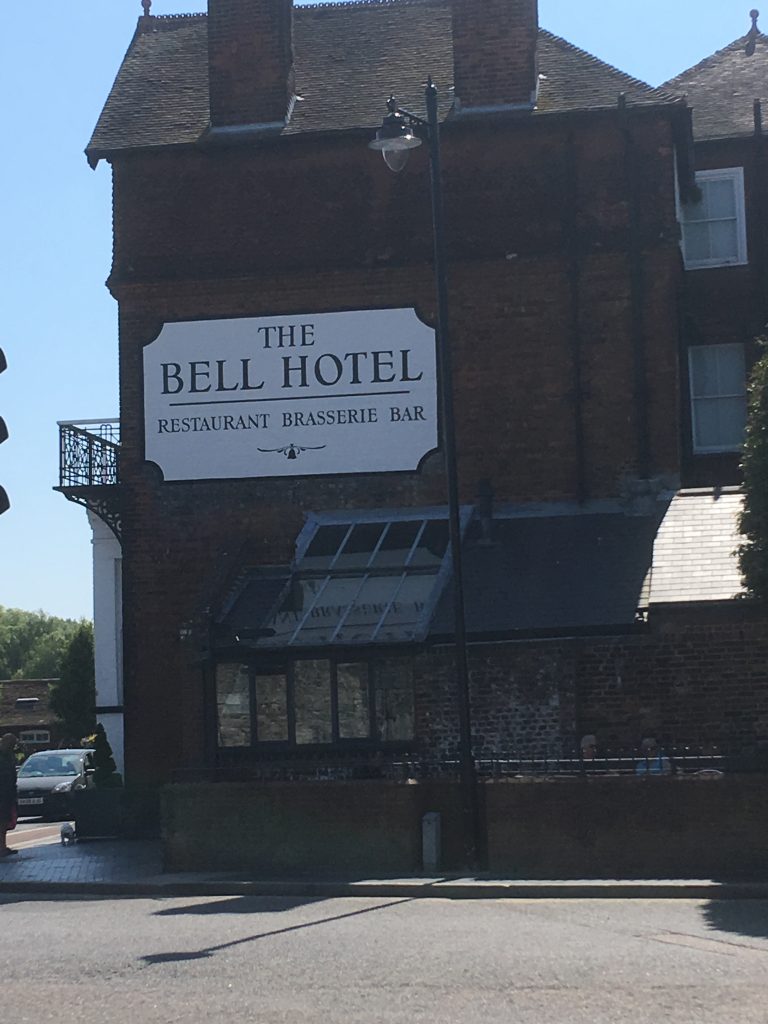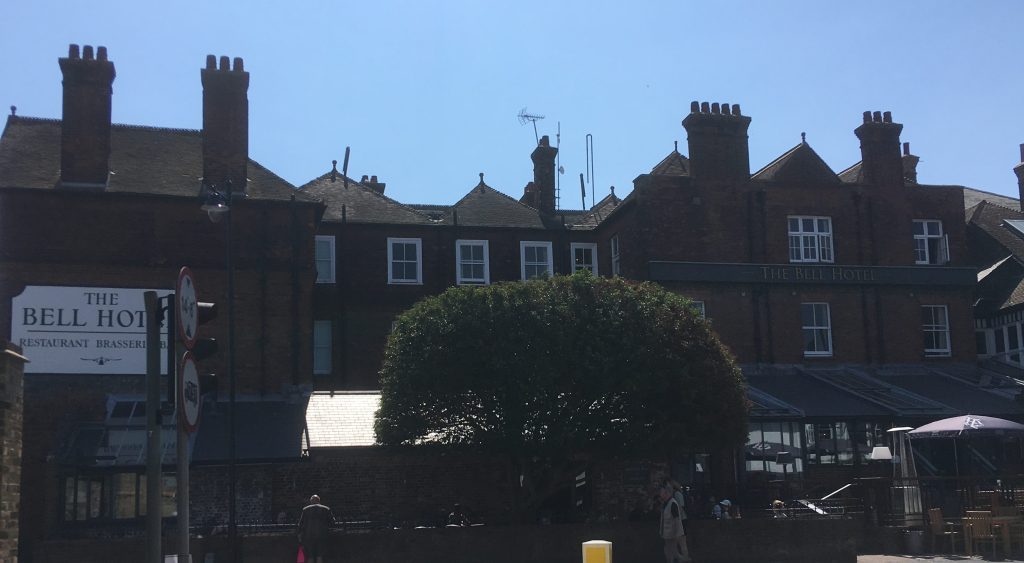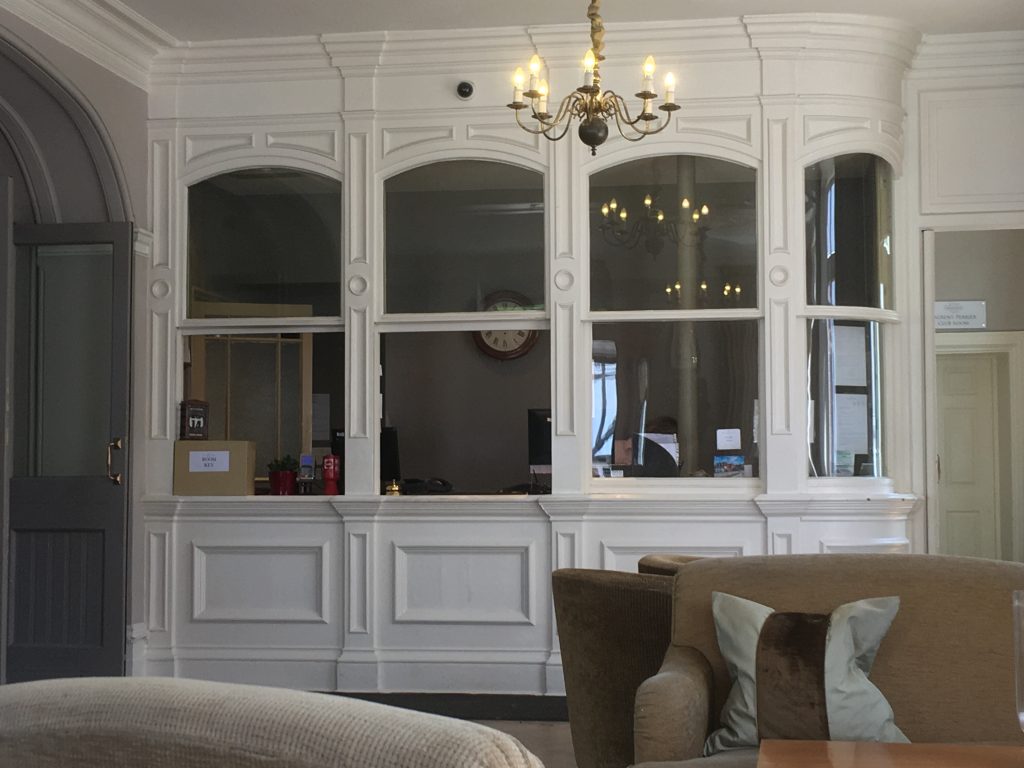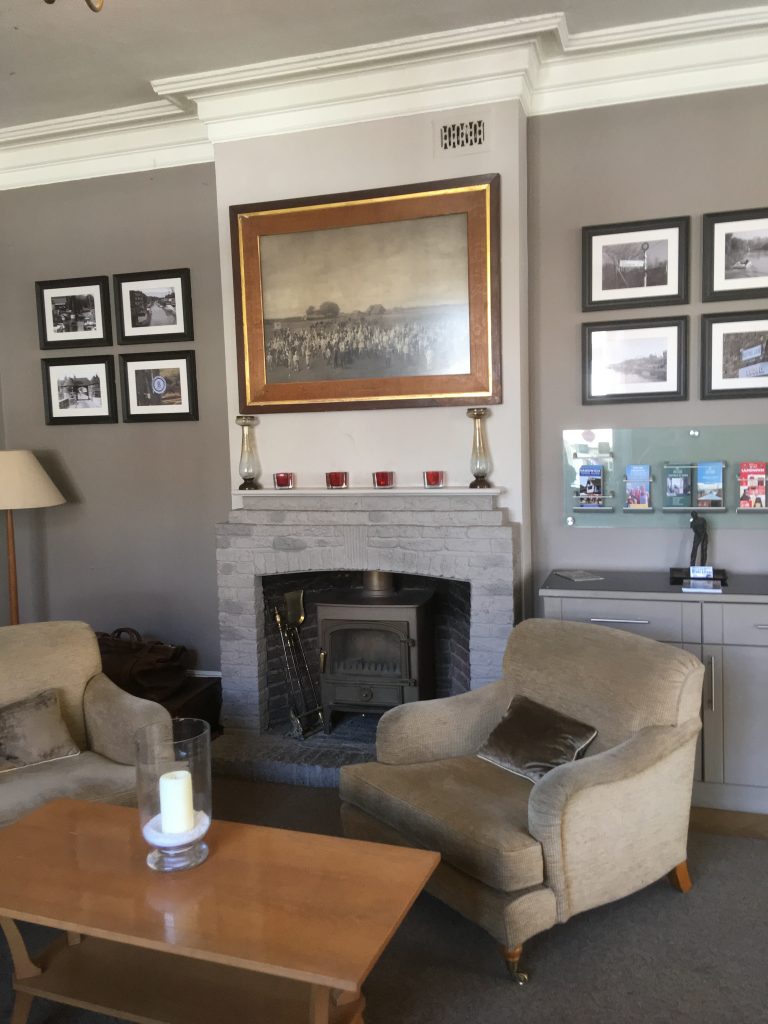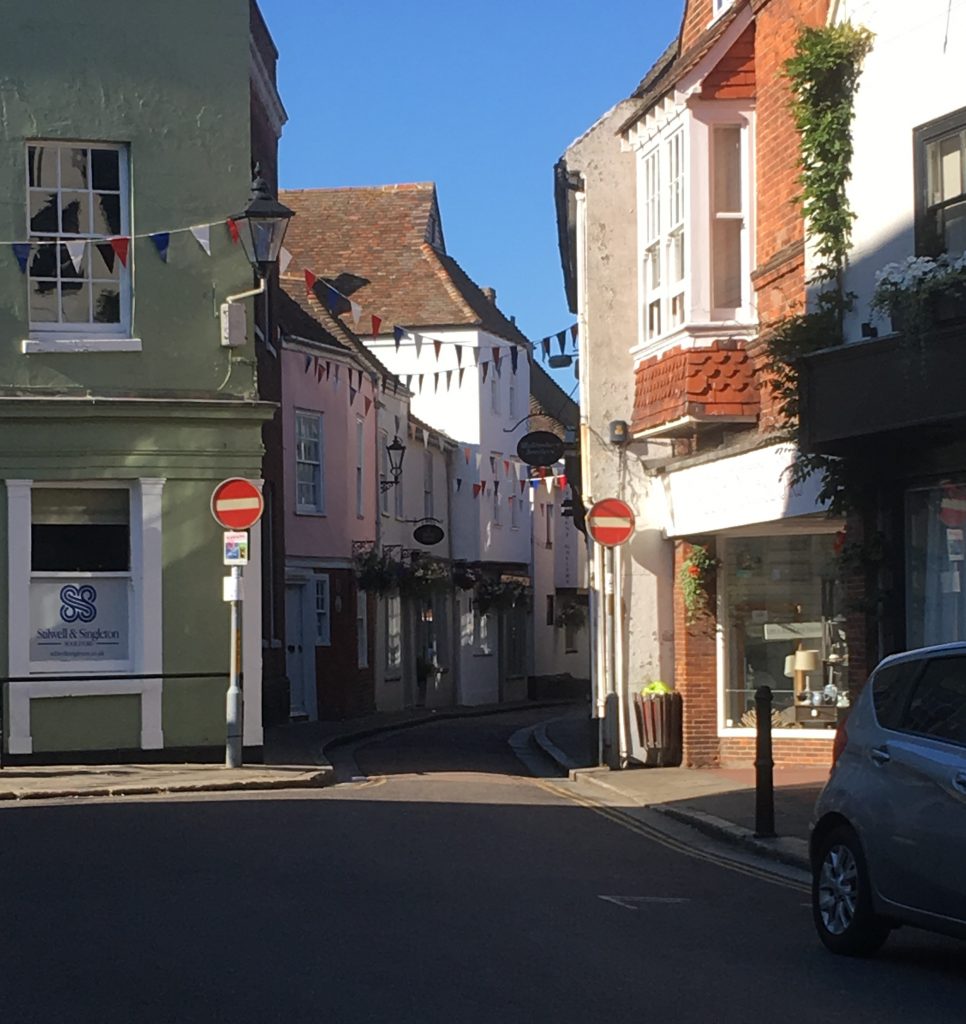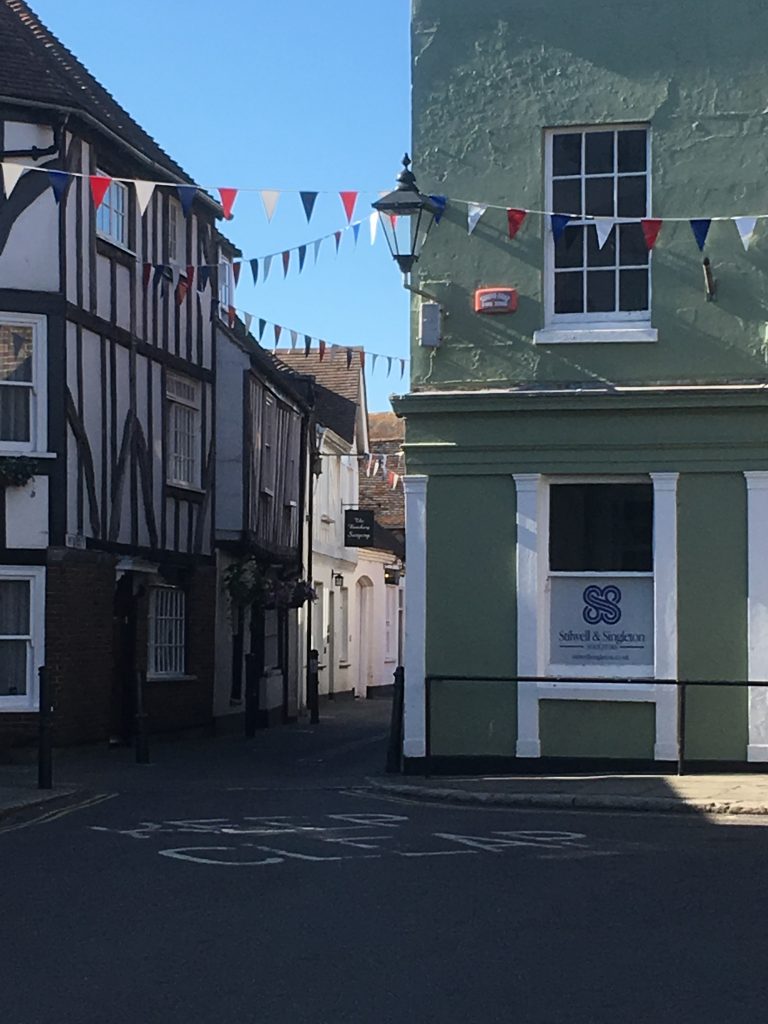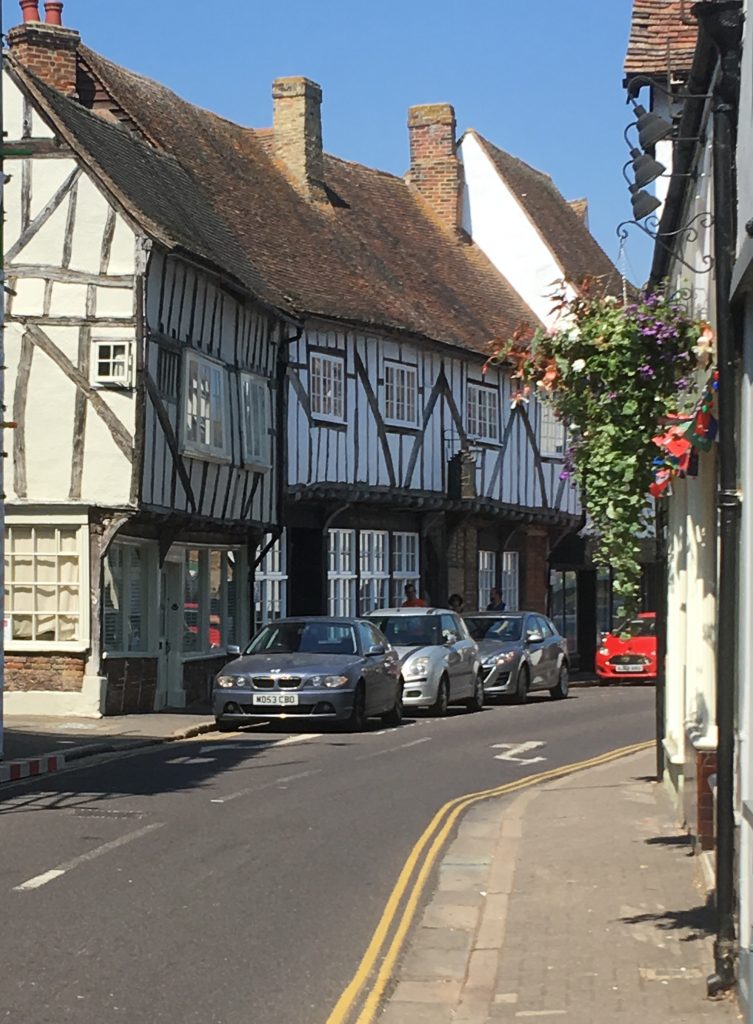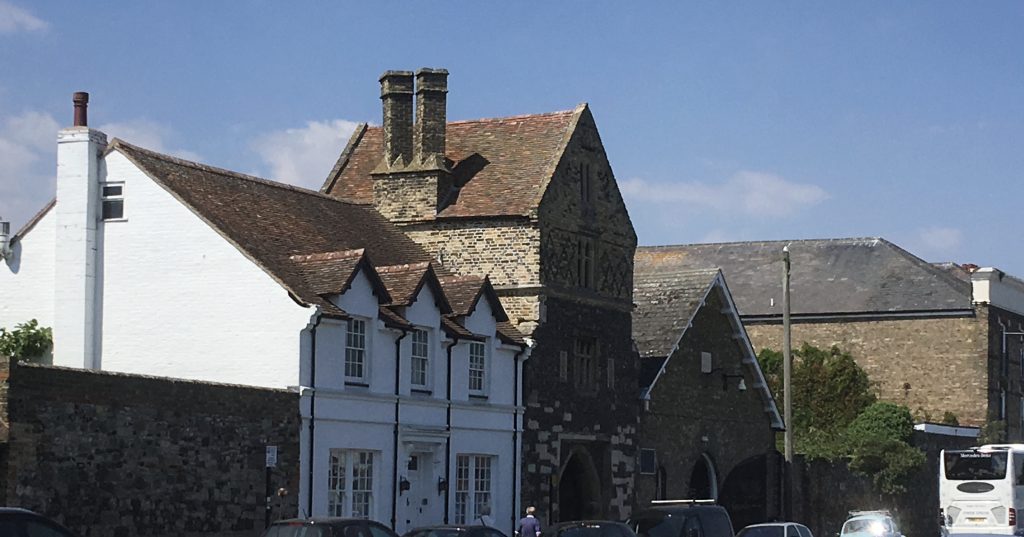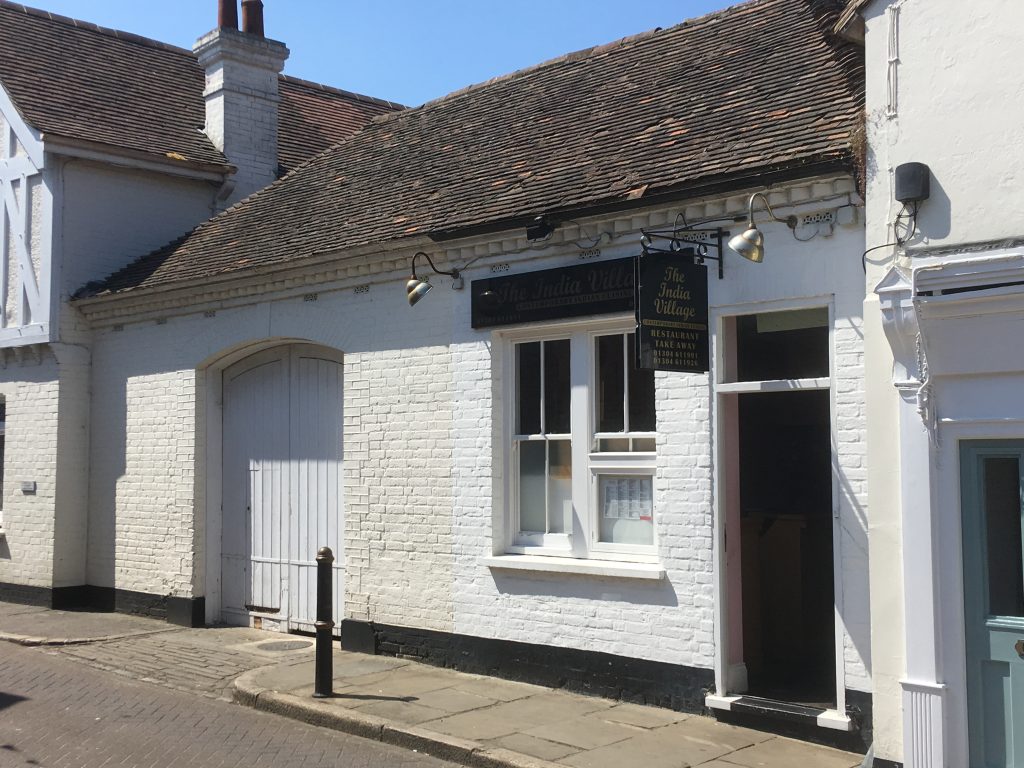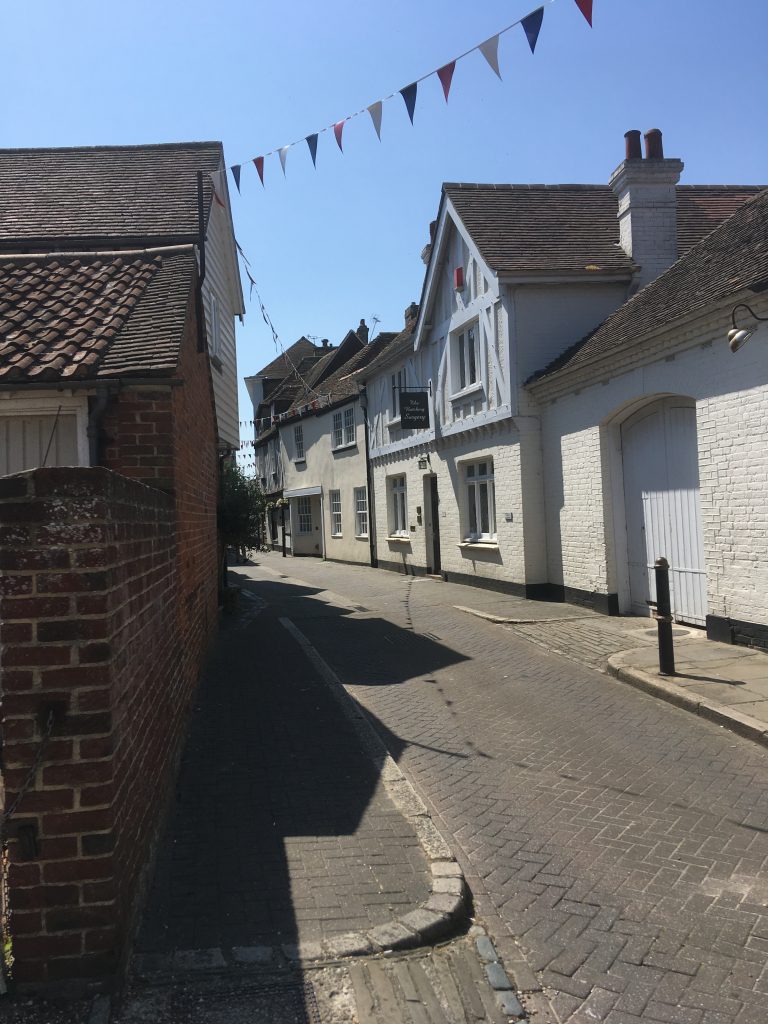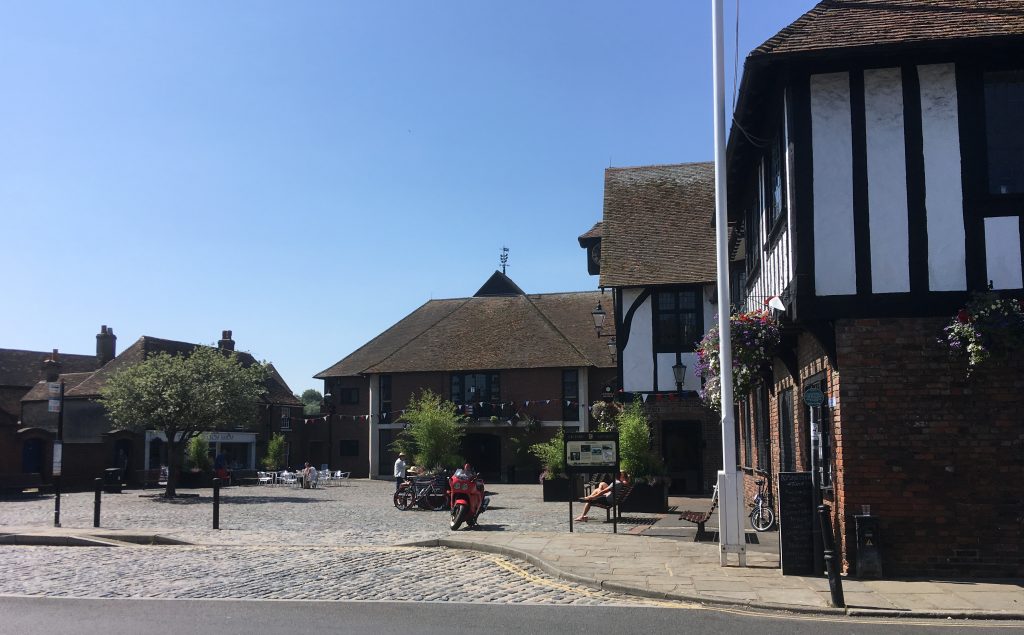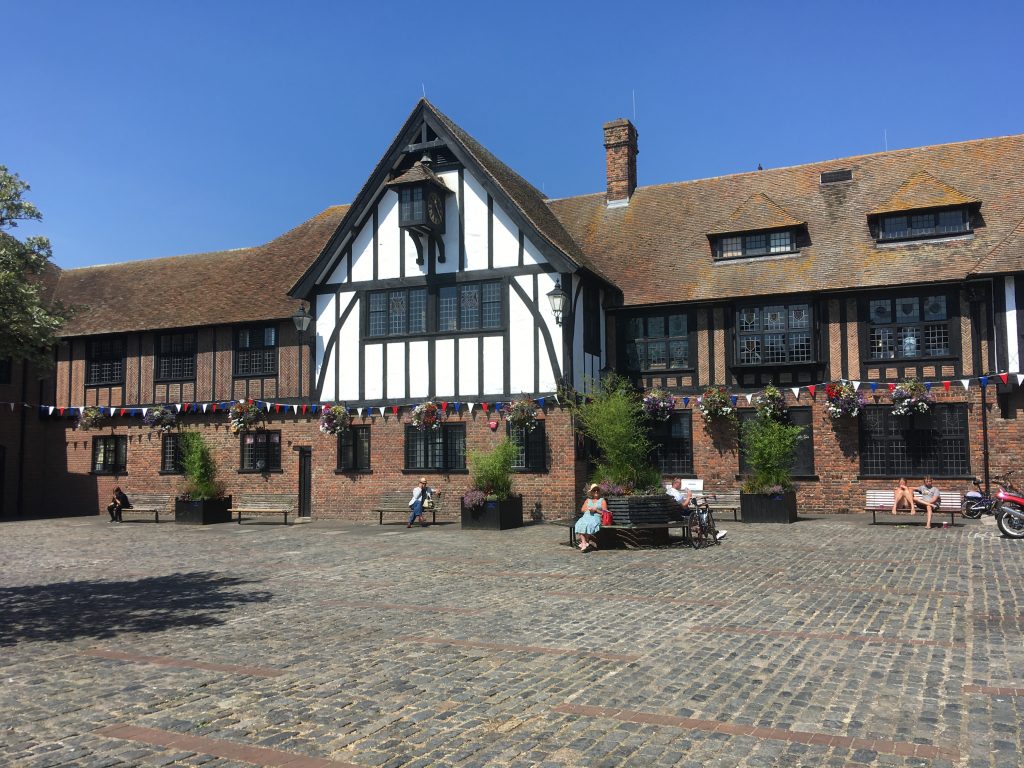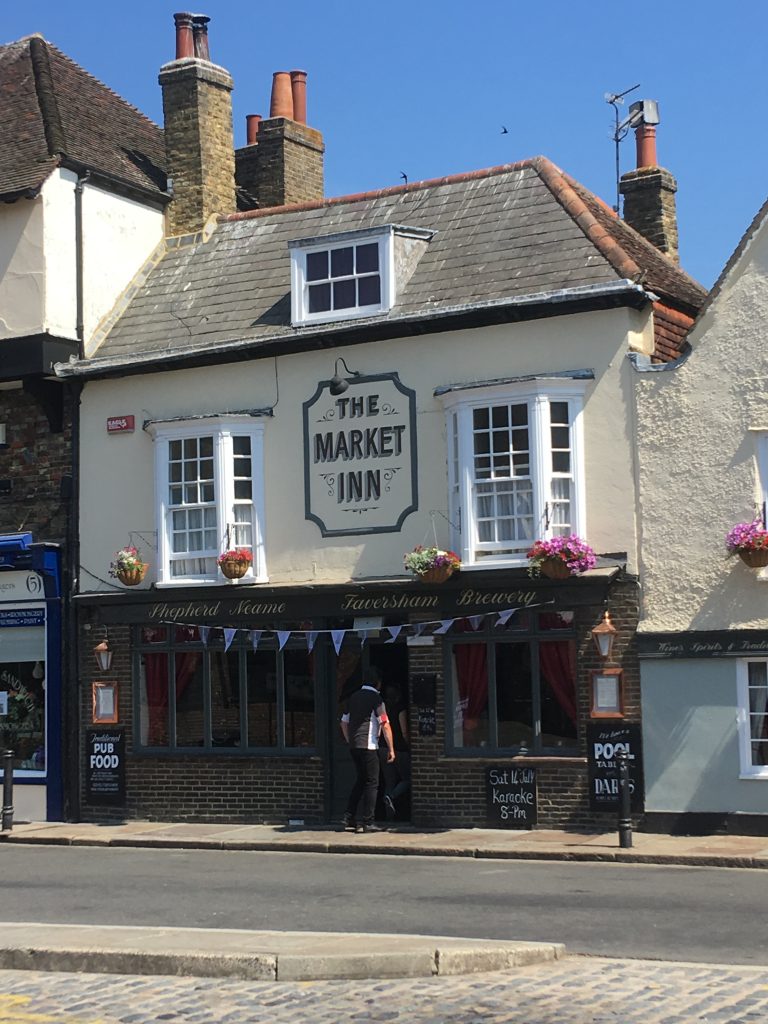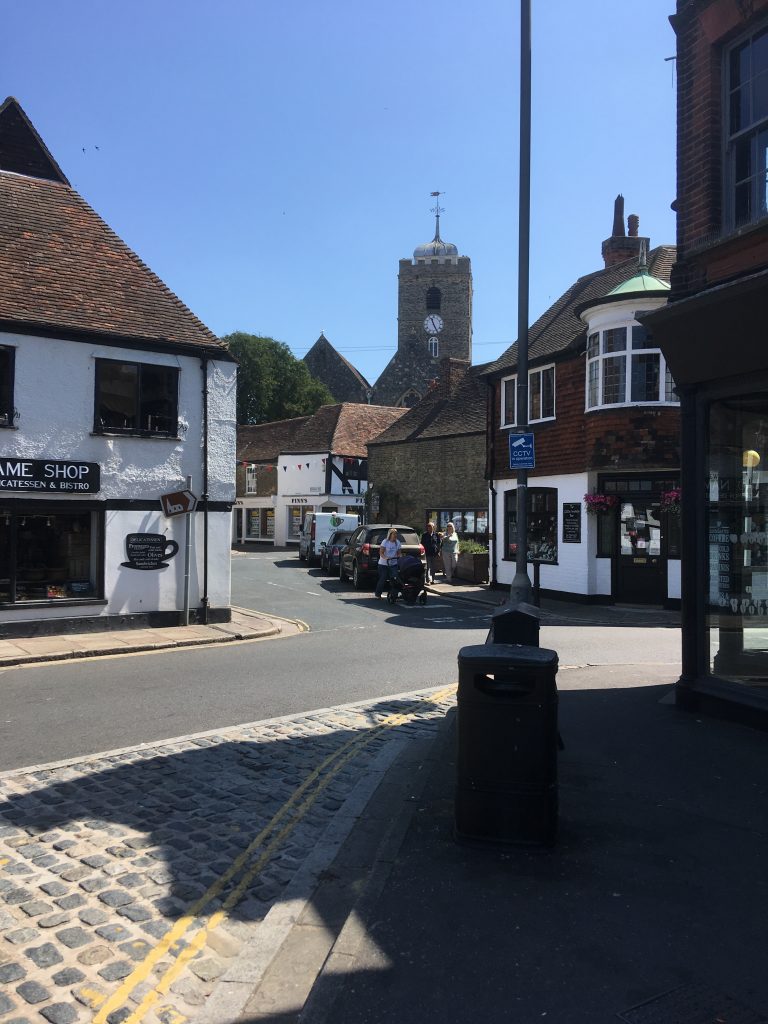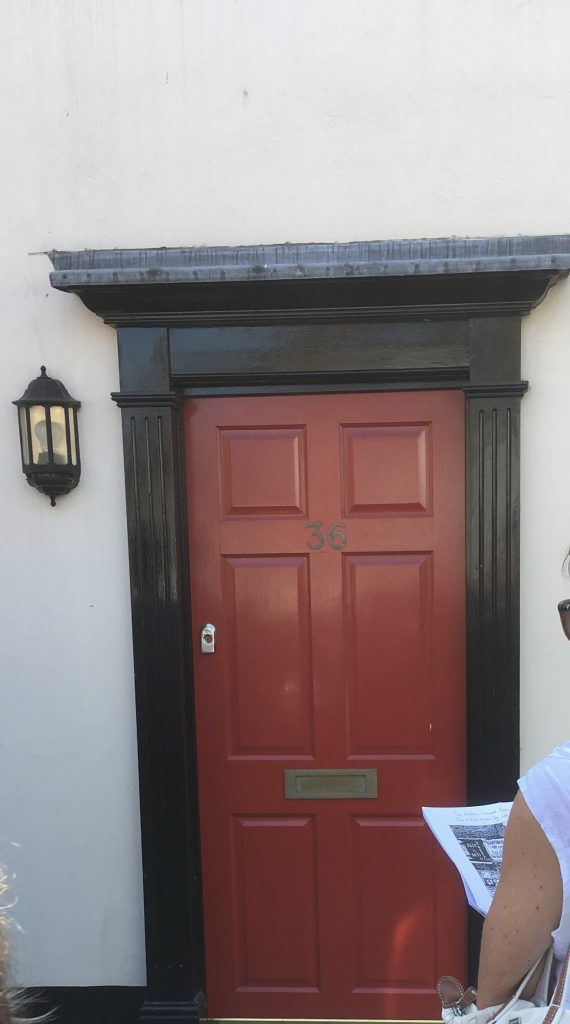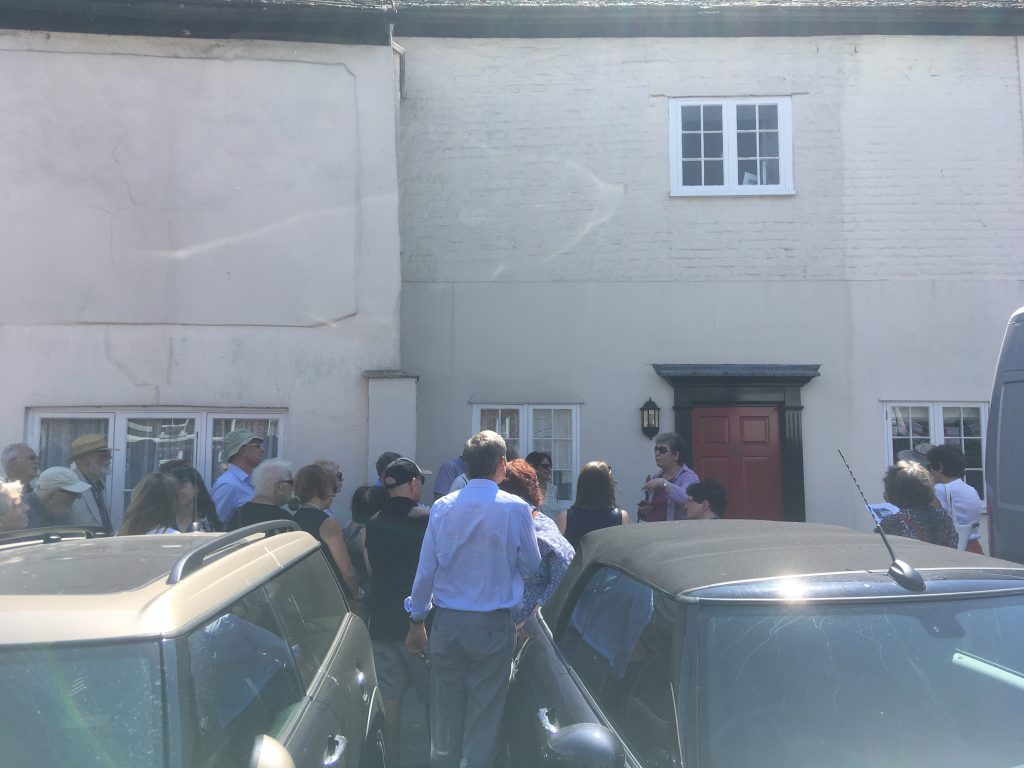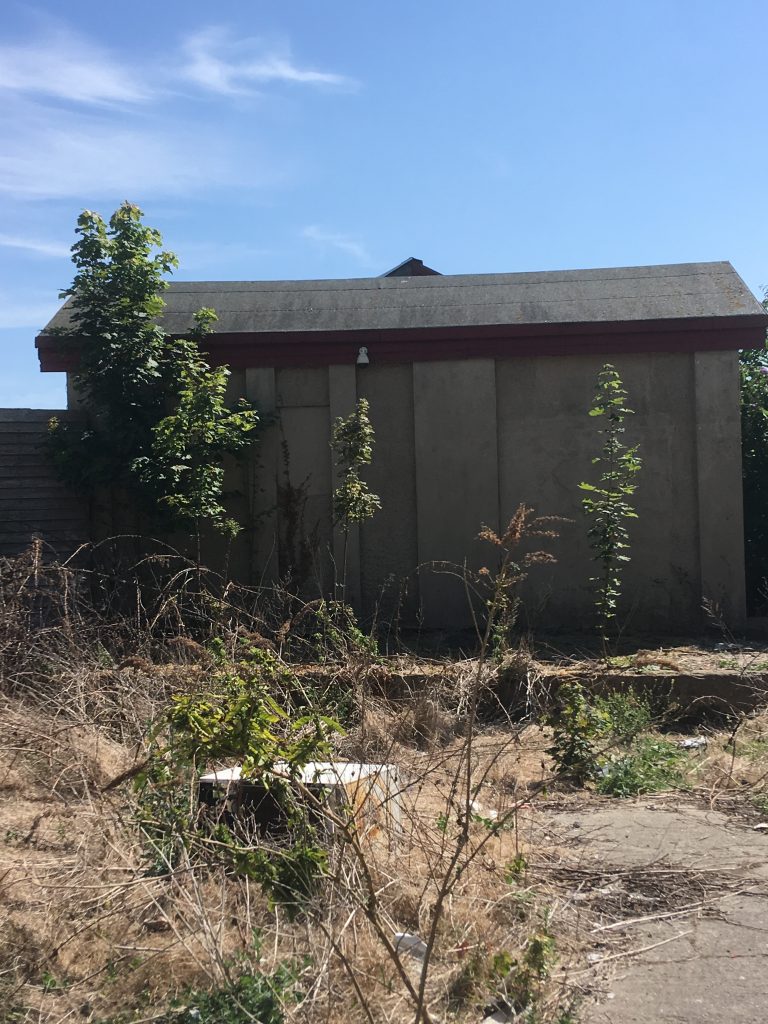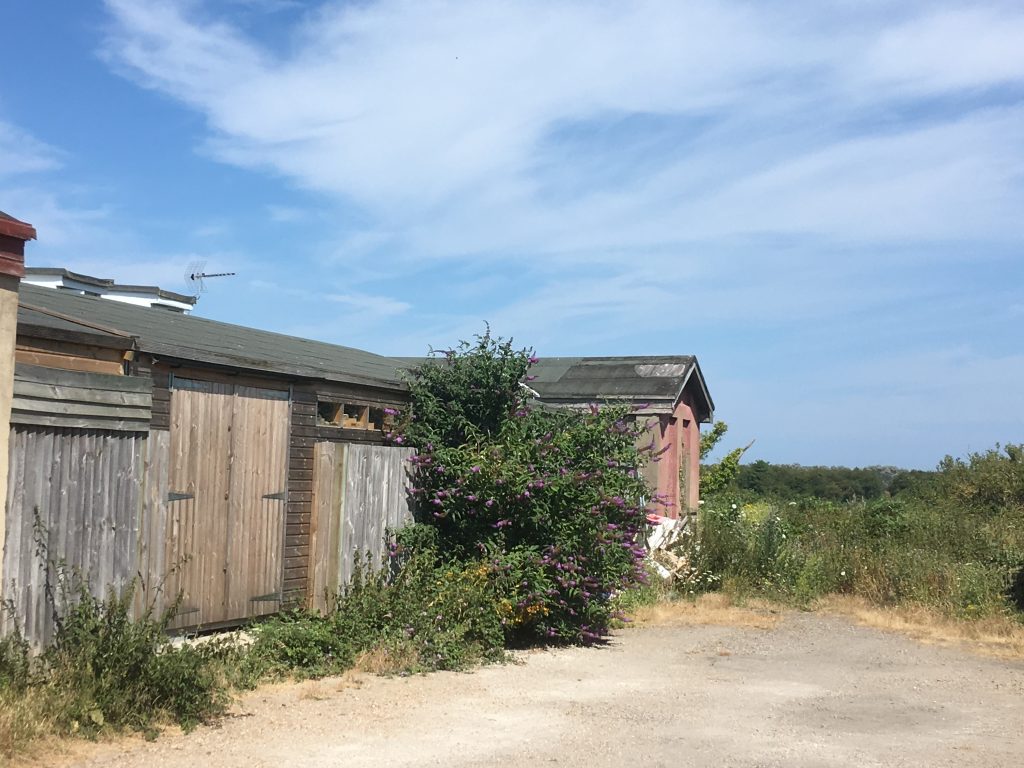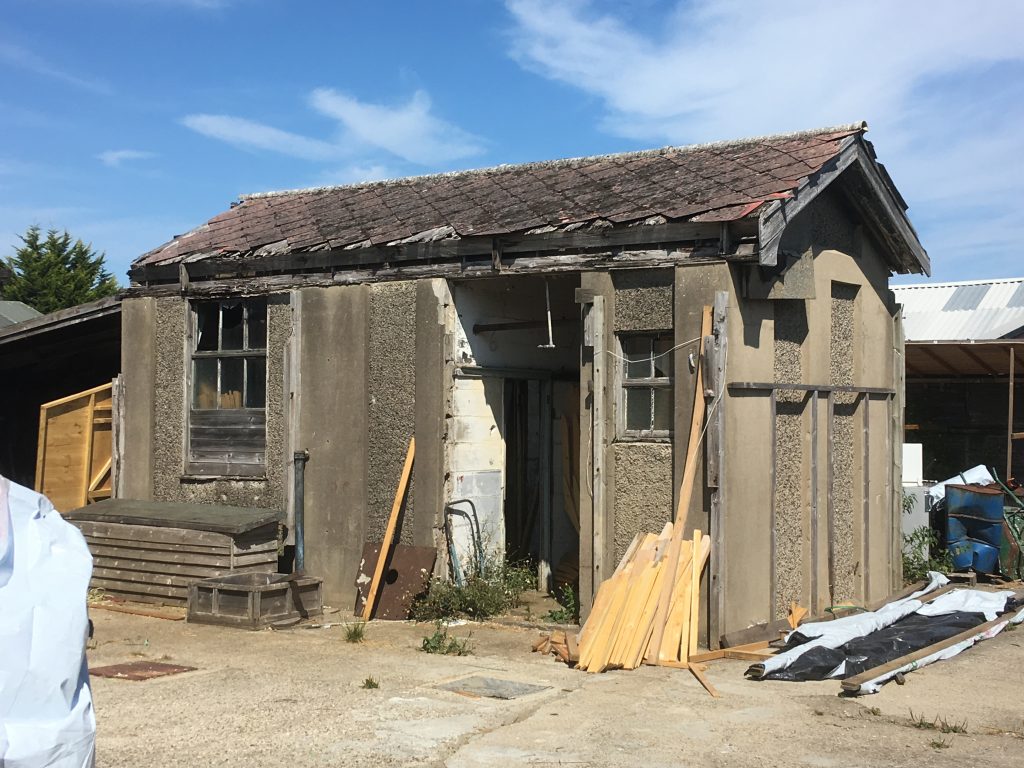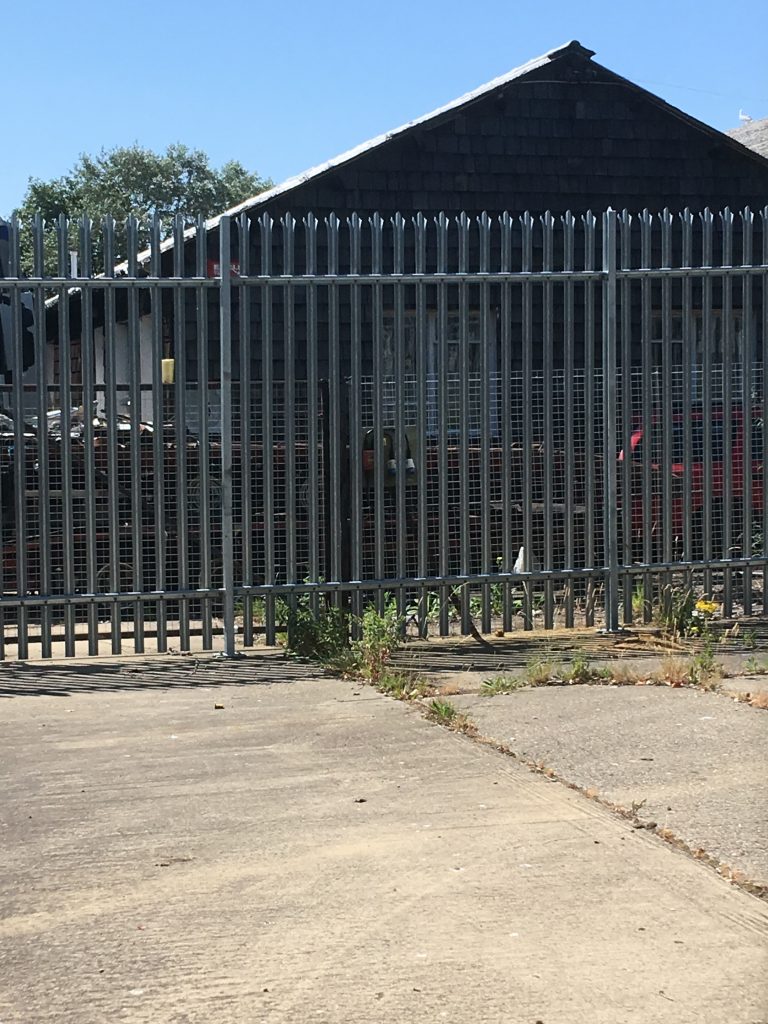A group of Kitchener descendants met in Sandwich at the weekend to see some of the remnants of places that our fathers, grandfathers, uncles, and cousins would have lived in or visited while resident at Kitchener camp for those few months in 1939 – 1940.
It seems such a shame – for those of us who are used to finding only remnants of the places in Europe in which our families lived, worshipped, and worked – that in Britain, too, we can only locate traces in relation to our relatives’ stay in Kitchener camp.
But – there it is – traces are what we have, once more – and something is better than nothing.
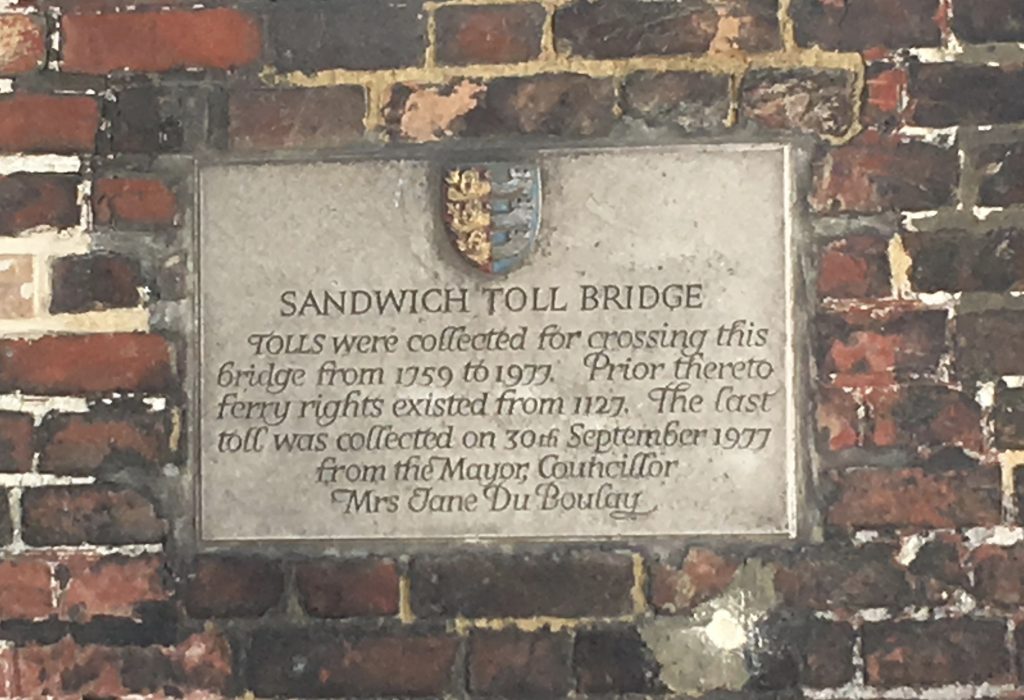
SUNDAY, 29 January 1939 I found that it does not take longer than ten minutes to reach the main gates of the Camp from the Toll Bridge which is opposite to the hotel, when walking at an average speed.
Friday 3 February 1939 … [T]he porter said there was a lorry driver waiting to see us. He had been held up owing to the fog and had not even a 1/- on him with which to pay the toll. All the lorry drivers cursed this ‘imposition’ to cross the bridge necessary to get on the road leading past this Camp. It is one of the last toll bridges in England and makes a fortune out of the town.
However, one of the lovely things about Sandwich itself in this context is that its chocolate-box prettiness means that many of the places we see today are still much as they would have been when our relatives were here 80 years ago: “Where once we walked …”, indeed.
Another really lovely aspect of our day in Sandwich is that we were joined by a number of local Sandwich residents – some of whom had families who took Jewish refugees into their homes. I am genuinely hoping that they will follow up on our discussions and send in some information and photographs, which would be a wonderful addition to this collection. We have always wanted to hear from Sandwich residents about these times and their collective memories.
Before I say anything else, I do want to say thank you to Kitchener author Clare Ungerson for organising the day for us all. She generously gives us an incredible amount of her time and energy, and we are very grateful to her for this.
Particularly for those families who live too far away to join us on these outings, I thought you might like to see some of the photographs we took – which I will also add to the relevant pages throughout the site, where these places are mentioned in the text.
It’s a bit of a ‘what I did on my holidays’ page, perhaps – especially for those who were there, but I hope it’s of general interest. I had a fascinating time searching places out to photograph for these purposes, and I hope they give you some enjoyment too.
Sir Roger Manwood school, Sandwich, Kent
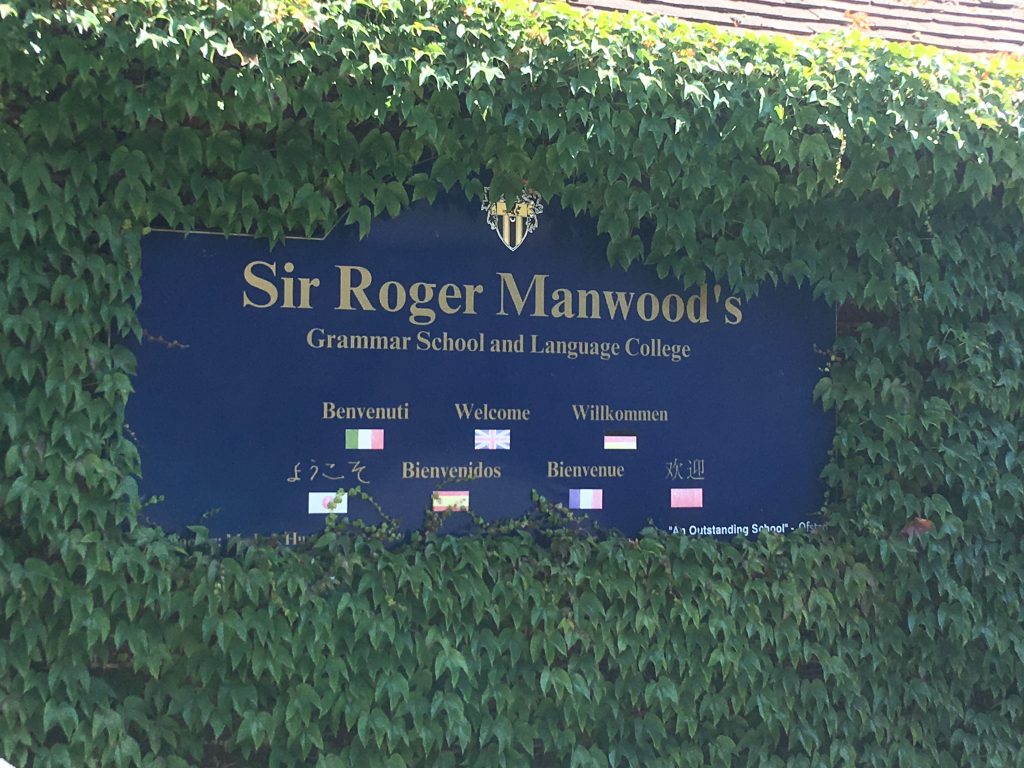
Phineas May, diary extract Saturday, 13 May 1939 After the usual Saturday morning programme immediately after Lunch I left with a Party of men for the Sir Roger Manwood’s school (a fine Secondary in Sandwich founded in 1500) to their Sports Day … they have beautiful grounds. I had selected only sportsmen for this party and they enjoyed it very much. We had been invited by the Head Master, a Mr Oates (a fine fellow) and he had arranged Tea for us. Our friend Lady Airedale was presenting the prizes and came up and spoke to us, and said she would invite some more men over to Tea next week.
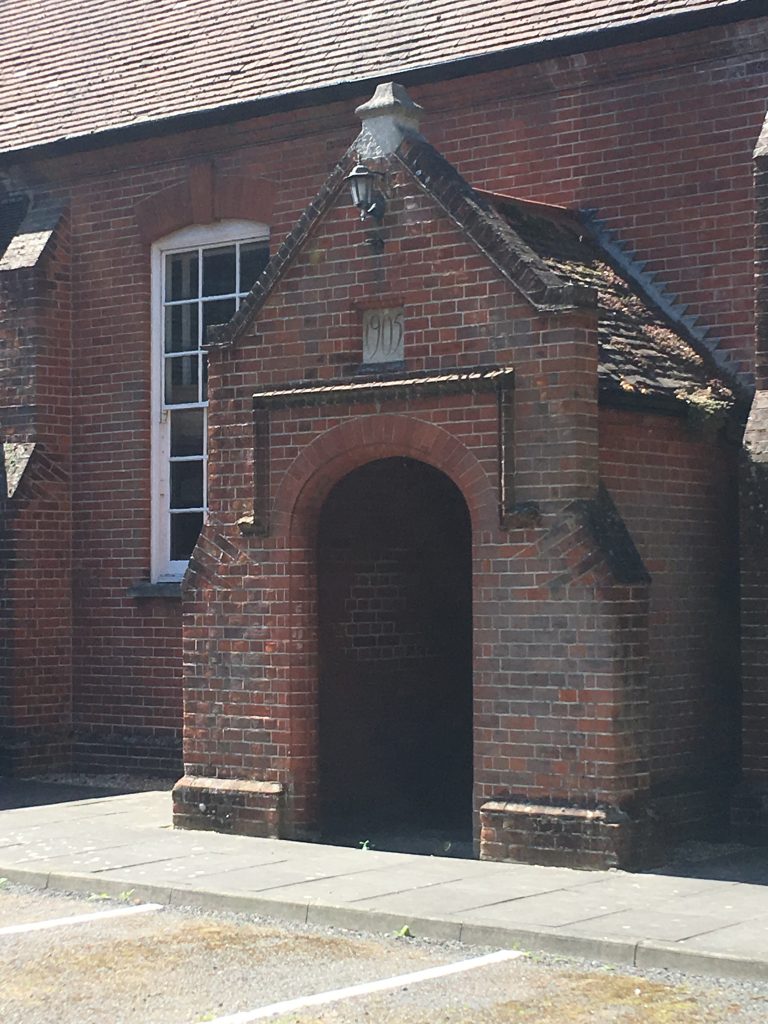
Phineas May, diary extract Friday, 26 May 1939 After much awaiting completed at 3 p.m. June issue of K.C. Review – 18 pages. In afternoon went to keep appointment with the Headmaster of the Sir Roger Manwood School at Sandwich, to go into details of sports day being held at his school on 24 June. The Sports Master has agreed to let us use their excellent sports ground in the evening during the week previous to run off the first races. The Mayor of Sandwich who is a Guvnor the School was there and I have agreed to let our Orchestra give a performance on July 1st in aid of the school funds.
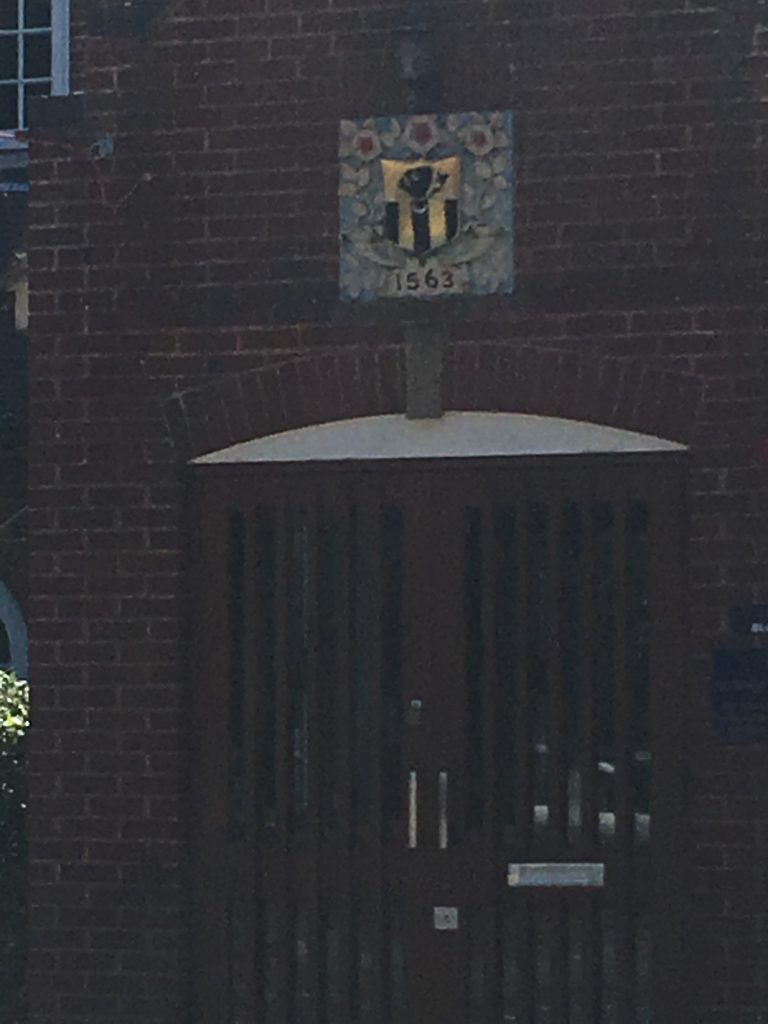
Phineas May, diary extract Tuesday, 23 May 1939 Excellent – the Headmaster of the Sir Roger Manwood School at Sandwich has consented to lend their beautiful sports field for a sports day for us on June 24th. I have an appointment with him on Friday afternoon to go into all details.
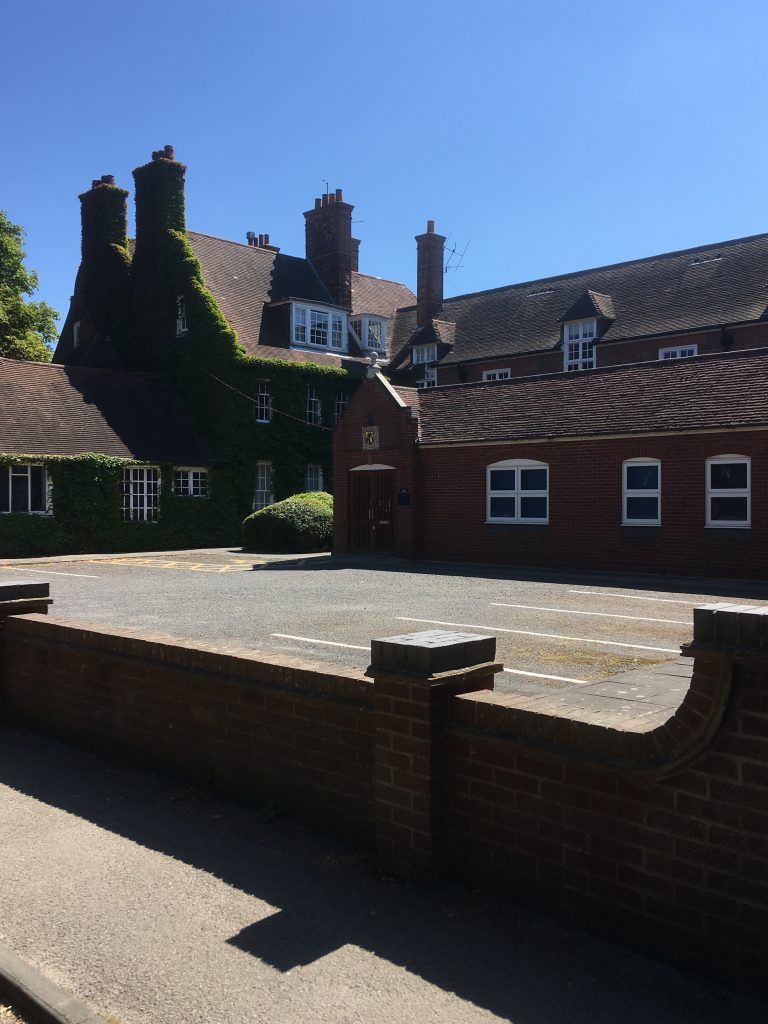
Phineas May, diary extract Monday, 5 June 1939 I with two Members of my staff went to the Sir Roger Manwood School to deal with the one hudred details necessary in connection with our sports day there on the 24th. We have had so many entries that there will have to be many preliminary heats the previous week. The Sports Master of the School, a Mr. Christian is a very charming fellow and gave us most valuable advice. At 8 p.m went to Sandwich and for a walk round the camp and took two of my Staff for a Coffee at the Tudor Tea Rooms, a beautiful old place. As we arrived back in Camp another 90 arrived from Vienna.
Phineas May, diary extract Monday, 19 June 1939 Went to the Sports Ground of the Sir Roger Manwood School to make any necessary preparations for our Sports day on Saturday
Phineas May, diary extract Wednesday, 21 June 1939 So the longest day has now gone. I spent the afternoon with two of my staff and the Sports Master of the Sir Roger Manwood School getting the school grounds marked out for Saturday. It all has to be marked out excellently. It is a lovely ground. The boys of the school were playing outside and it took me back to my boyhood again. A party of 27 men arrived who had been stranded off Cuba on the St. Louis.
Phineas May, diary extract Friday, 23 June 1939 Completing final pages of K.C. Review. Went to the Sir Roger Manwood Sports field and helped with the final details of the Sports programme and laying out the track.
Margate: Hebrew Congregation
Phineas May, diary extract Wednesday, 28 June 1939 At 8.15 I received a message to come over to J., flat. One of the men had died in the Kent County Mental Hospital. I `phoned up the Hospital, London, Margate to make all the necessary funeral arrangements. It is rather strange that we had a Birth, a Marriage and a Death within one week.
Phineas May, diary extract Sunday, 25 June 1939 Tried to bring all my work up-to-date so that I could go up to London after the Camp Wedding at 4.45pm. The Bridgegroom had been dressed by his comrades in evening dress – he might have been going to a Wedding ceremony in the East End. Ivy who was to give the Bride away brought her to the Synagogue in his car. She (the Bride) looked really charming. I made Banks act as best man and J., acted at the Father. The Synagogue had been decordated, and with the real Chupah and Minister from the Margate Synagogue it was very “Kosher”.
Phineas May, diary extract Thursday, 22 June 1939 J. and I were on to London and Margate synagogue and completed all arrangements so that the young couple can be married under the chuppah in our synagogue on Sunday afternoon. Rather strange that it should be the very afternoon of my first leave to go to London to a Wedding.
Phineas May diary, extract Monday, 14 August 1939 Got through a considerable amount of post and more interviews and had several “Wedding” consultations. Went to Margate to pick up Rabbi Cohen and returned we he officiated at a Wedding under the Chuppah in the open air.
Phineas May diary, extract Monday, 21 August 1939 At 5.30 there was another Wedding. This time at the Margate Synagogue at which I again acted as Best Man, the Margate Ladies Guild had provided a nice little reception afterwards for the couple.
Kitchener camp – trains to safety

This map shows the main railway line and the branch line into Kitchener camp (for a version you can enlarge, see the Kitchener camp page here):
The branch line into Kitchener ran off the main railway line, which is just visible through the trees in the image below. This picture was taken from the bank at one side of Richborough fort ruins, which the men visited, and to which Phineas took a few of the Dovercourt boys not long after they had arrived.
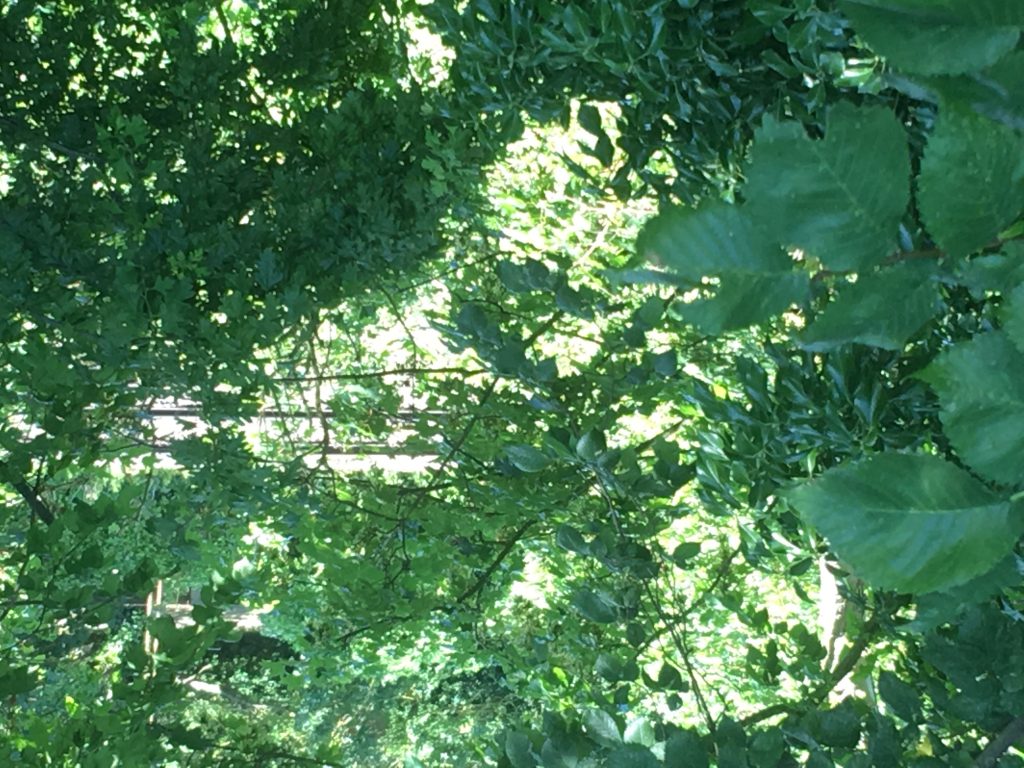
Richard Hymann transcript of interview, 12 June 2003 “We had to stop at Cologne, it was at night, we didn’t see much of Cologne, we never got off the station you see. And then we went to, we went over the border at Arnhem in a van, and then hurray, you know and then we went over to Dover and from Dover to Sandwich. ... there were one or two compartments reserved for us”
Kitchener Camp Review, March 1939 – extracts "Arrival of the refugees It is usually evening when the refugees arrive, struggling with their heavy trunks, sacks, rugs and coats over the churned up roadways which lead between the long, low huts …"
Max Abraham (ORT teacher) transcript Abraham mentions having a short medical examination on arrival at Harwich, “but only very superficial”. They then travelled onwards again to Liverpool Street train station in London, arriving at two o’clock in the morning. "It was absolutely terrible, and then we went to Woburn House and from there to the Kitchener camp. And that’s where we enjoyed ourselves. It was like a holiday camp.”
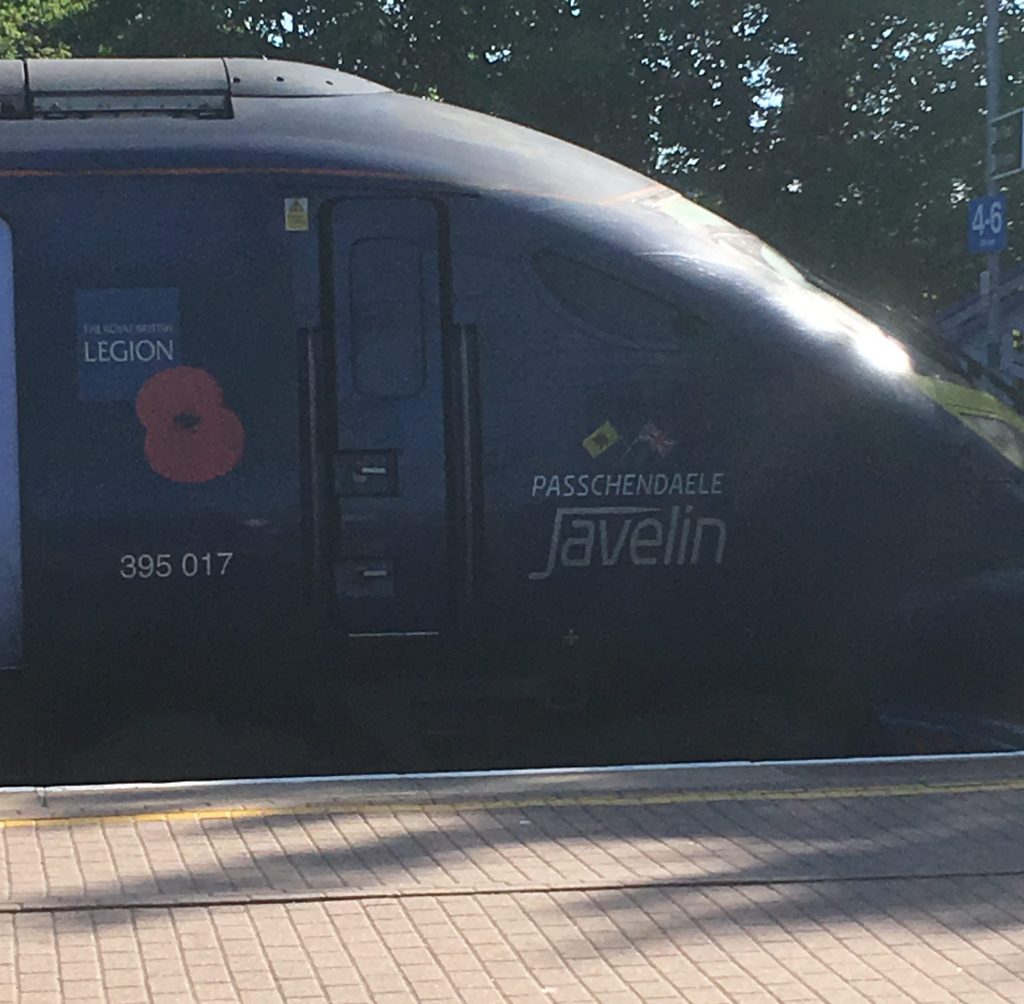
Siegfried Metz: "The boys were split into two groups to travel to England. On 29 August 1939 the first group of 106 boys (including Siegfried) and their tutors travelled by train from Berlin to Hook of Holland, then by the Polish transport ship SS Warszawa to Harwich and then by train to Liverpool Street station. They stayed overnight in the East End of London before travelling to Kitchener Camp at Sandwich. Siegfried appears in a group photograph of the ORT boys in the camp under the name of Sigi Metz."
Tuesday, 6 June 1939 Arrivals: Werner Weissenberg, Fritz Bleicher, Erich Silbermann, Siegfried Silbermann
Joachim Reissner: Together with his fellow students, Joachim travelled from Berlin to Cologne, crossed the border to France, took the ferry to Harwich, then took another train to Waterloo Station. From Waterloo, under the supervision of Lieutenant Col. Levey, they marched to Rawton House in Whitechapel and were then put on another bus to the county of Kent – the Kitchener camp. Presumably Joachim was reunited with his older brother, Willi, who had arrived at the camp in April 1939. From Kitchener camp, the ORT boys travelled to Leeds, where the ORT School had been relocated.
Thursday, 13 July 1939 Arrivals: Richard Cohn, Lothar Nelken, Herbert Nachmann, Samuel Goldstein, Hans Friedmann
Sunday, 27 August 1939 Phineas May - diary extract "On our return to the Camp at 11.30 we found J. and Banks waiting for the arrival of 13 men from Germany. and 2 Blind Boys of 11 and 12 who had not been picked up at Dover." Monday, 28 August 1939 Arrivals: Erna Finkelstein
From Wednesday, 30 August 1939, onwards Arrivals: Peisach Mendzigursky, Herbert Nachmann, Joachim Reissner, Isidor Wilkenfeld
Richborough Fort
This old Roman ruin was something of a favourite day out from the camp. On visiting it, I could see why. It’s a huge site and very isolated in the present day – and beautifully peaceful.
Phineas May diary, extract Wednesday, 24 May 1939 After the evening service I went for a walk across the fields to Richborough Castle with three of the Dovercourt Boys.
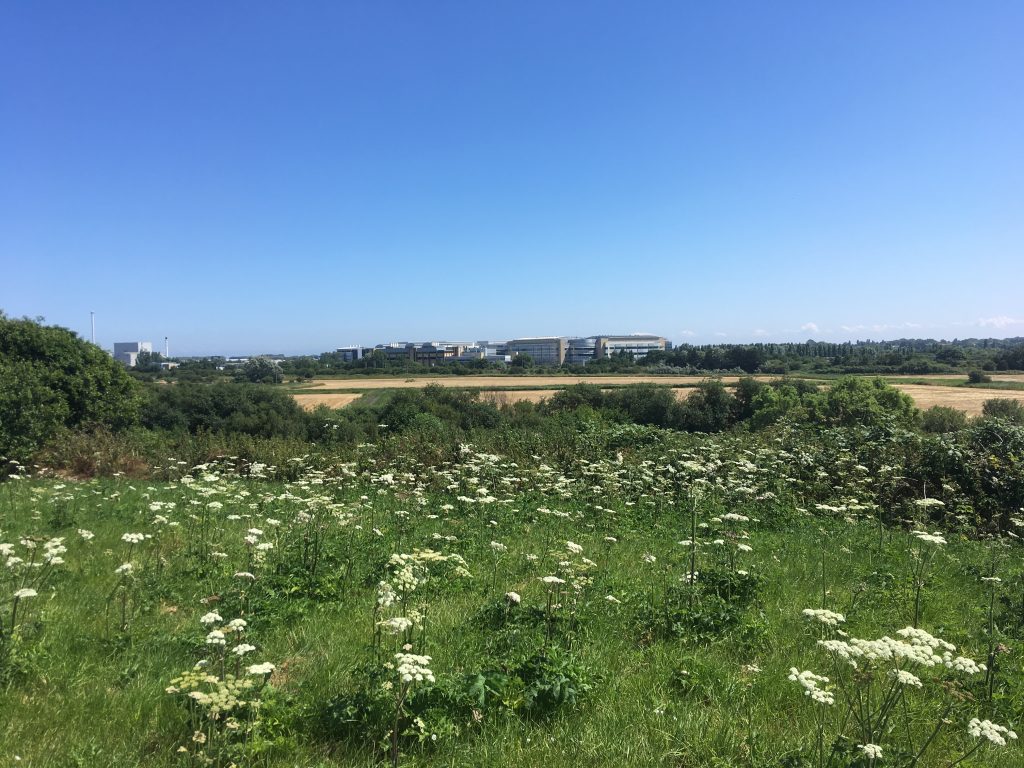
Phineas May: diary extract Wednesday, 22 March 1939 The most interesting item today was a visit I made to Richborough Castle to find out if special items could be made for the Refugees to go over it. Ivy drove me over and David and Nurse, I suppose this must have been his first visit round a place of historic interest. Richborough Castle is reached by a narrow road and when over there came to a level crossing the gates of which were closed. After waiting patiently for the train to pass that did not, Ivy espied a notice which read “Please Ring the Bell”. That done, two Railway men came out of a hut and proceeded to open the gate which could have been better opened by David himself...
Phineas May: diary extract Wednesday, 22 March 1939 ... The road runs towards the castle which was built flat on top of a hill. From the grounds of the castle which are beautifully laid out, a wonderful view of our Camp is obtained. Richborough Castle is scheduled as an Ancient Monument and is maintained by the Office of Works, Whitehall, to whom I will have to write for special terms. It is of course hundreds of years old and only a few walls are standing, though the foundations of the other walls indicate the complete plan of the castle...
Phineas May: diary extract Wednesday, 22 March 1939 It must have be an immense place, the construction of the walls is in itself interesting. We explored the underground passages and I should think that it must be one of the finest unintended air-raid shelters in these parts. David was much intrigued. The Curator said that if we would like he would give his descriptive talk about the Castle but it would take three hours. We said that we appreciated his kindness but we had to get back to the Camp early – it was a good excuse anyhow. The moats ... are all preserved. It is certainly worth a visit if one is in the neighbourhood and one has a little imagination to conjure up the past.
Phineas May, diary extract Monday, 29 May 1939 In the afternoon we had an audition for fresh talent in the Camp, and in the evening a repeat performance of our Saturday night show. I took Halford and my Office Staff a short cut across the field to Richborough Castle and took them over it.
The cross in the picture above marks the place where a massive arch used to stand in the days of the Roman Empire. It is estimated to have been around 24m tall – so tall, in fact, that it would have been visible from midway across the channel, and was probably used as a guide by ships.
The Bell Hotel
See also Clare Ungerson’s excellent book, Four thousand lives (History Press 2014), for further information and detail about the place of the Bell Hotel in this history.
Phineas May diary extract SUNDAY, 29 January 1939 At the Bell Hotel they were expecting me, “Jam” having left a message to say that we were not to go to the Camp if we arrived after 12.15… we had timed it well. A little later Jam arrived with Mr. and Mrs. E.M. Joseph and Donald A. Woolf, and soon we were at lunch...
Phineas May diary extract Monday, 30 January 1939 Having just listened to what Hitler said “We don’t want the Jews, if other countries are so sympathetic they can have them” I should not be at all surprised if “Jam” does not phone down tomorrow to say the 3,500 are coming at once and have a meal ready for them with within half-an-hour and all beds to be erected and well aired. Maybe that my roughing it at the “Bell” Hotel will be short lived and I may have very soon to enjoy the “comforts” of the Camp. And so has gone my second day down here – though slightly cold a lovely sunlit sky – ah well – once again to bed.
https://kitchenercamp.co.uk/research/julian-layton/ Layton was called upon once again, therefore, and arrived in the middle of October 1939. He stayed at the Bell Hotel in Sandwich to start with, where Phineas May had stayed when he first arrived there. Layton attended to the pastoral care needs of the remaining men as best he could under the circumstances, and by all accounts was successful at defusing the tense standoff that had arisen.
Phineas May diary extract SUNDAY, 29 January 1939 The bedroom has running hot and cold water; is spacious and everything desirable. I imagine I shall be the only person staying here this week so “Jam & Co” have been rubbing in the “hardship” of my having to “rough it” like this for a week until the Camp is ready. I have promised to endeavour to tolerate this luxury on the condition that it is not for a longer period than one week. Mr and Mrs Joseph left for London soon after lunch and we motored over to the Camp. Subsequently I found that it does not take longer than ten minutes to reach the main gates of the Camp from the Toll Bridge which is opposite to the hotel, when walking at an average speed.
Phineas May diary extract SUNDAY, 29 January 1939 A word here as to the hotel. It has recently been done up and is most tastefully furnished and roaring fires in open grates are a pleasing feature. If we were members of the Royal Family we could not have received from all the staff more kind and courteous attention. They were all out to please.
Historic Sandwich – town centre
For an example of a pass for a day out from Kitchener, see Ferdinand Vulkan
See Richard Cohn / Letters for reference to a pass to leave the camp: "First thing, I'll go to London and have the money written in my name. A pass to London is generally granted only after four weeks, but I hope to be able to go earlier"
Phineas May, diary extract Monday, 28 August 1939 A very busy day. 3 marriages to arrange, one death, and A.R.P. Took parties of men to Sandwich to assemble Gas Masks, and then arranged with Mayor Office to have them all brought to the Camp and so men worked until late into the evening and completed the assembly of them.
Phineas May diary extract Sunday, 16 July 1939 A day of incidents amongst them was a call at my office from the Camp Police with a member of my artists group. The fellow is an awfully nice young man of 23 who had been married only 8 months, and his 21 year old wife has a job as a domestic in Sandwich.
When the Kitchener men and women left the camp with a pass for some time out, they would have crossed this bridge (below) on the road from the camp to the town.
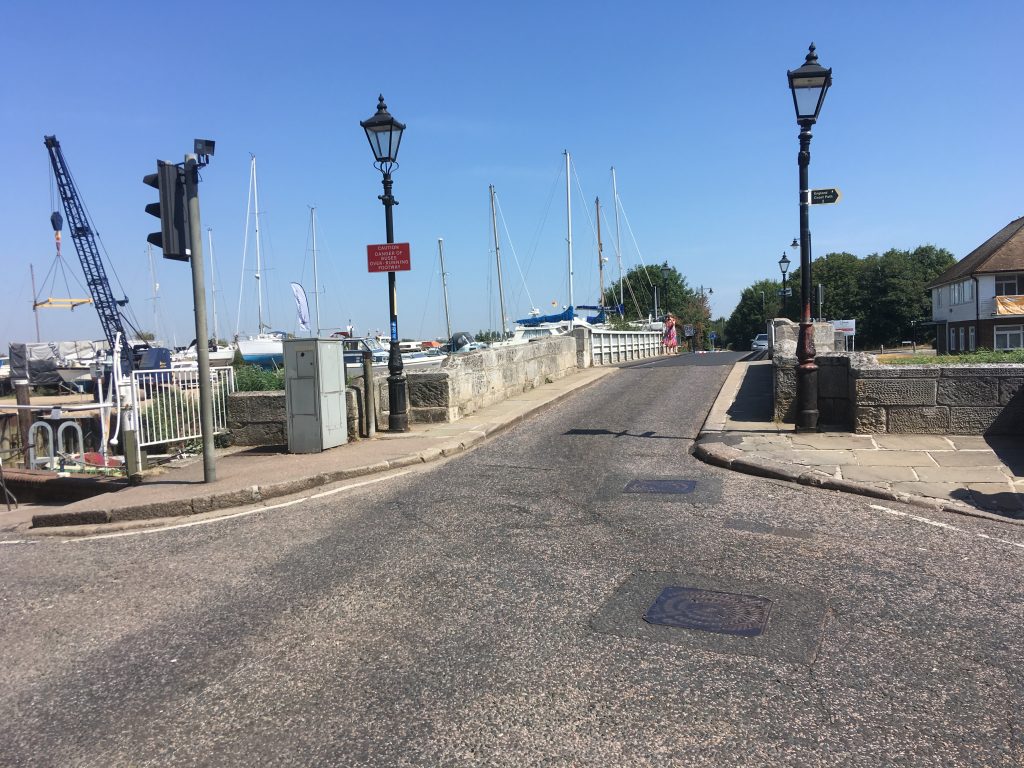
Phineas May, diary extract Thursday, 30 March 1939 Went with Banks to the town hall and in the court room we discussed with the various town officials A.R.P. for the Camp and afterwards went with the Chief of the Fire Brigade to the Fire Station where he showed us the town’s complete fire fighting appliances for air raids. He was the third generation to be Chief of the Brigade and his grandfather started in 1814. There are of course no resident firemen but if there is a fire he can press a button which rings a bell in each man’s home. If they then don’t turn up he apparently sends them a postcard.... A further batch of 108 arrived from Vienna in the evening.
Phineas May diary extract Thursday, 9 February 1939 No more Refugees arrived at 6.30 p.m. we were fetched and taken by car to the Town Hall for the Chamber of Commerce Annual Dinner. The Town Hall is, by the way, in parts hundreds of years old but a great part of it has been rebuilt at different periods.
Phineas May, diary extract Monday, 6 February 1939 The Chairman (Mr Bishop) and the Secretary (Mr Fogg) of the Sandwich Chamber of Commerce came over to the Camp in the evening to invite “Jam” to be the Guest of Honour at a dinner they are holding on Thursday, and also extended an invitation to me, which I have accepted providing no Refugees arrive in the meantime. “Jam” is going to respond to the toast of the Visitors.
Phineas May, diary extract Thursday, 9 February 1939 After the supper followed a dance and of course frequent visits to the bar. Everybody in the town engaged in commerce were there, and some useful acquaintances were made. Alderman Martin, his son and charming daughter-in-law had catered for this function and were very proud of it. They are Bakers and will be supplying the Camp with Bread – a very nice order. Anyhow they looked after us extremely well and are really good folk.
Kimber’s coffee shop, Sandwich
A local store – the Golden Crust Bakery – had a few chairs and tables in the back, where they served meat pies and cups of tea. When asked for a cup of coffee by our Austrian and German family members, Mrs Kimber served ‘Camp’ coffee to start with. However, she was soon persuaded to purchase the real thing, shown how to make it, and the men then had somewhere to go for Kaffee und Kuchen, which was apparently so popular that by summer 1939 it was often standing room only at Sandwich’s Golden Crust https://ajr.org.uk/wp-content/uploads/2018/02/2010_January.pdf
As a final set of photographs for now, we had the most ridiculous few minutes at the site of Kitchener camp.
The coach pulled over so that we could try to locate the rumoured one remaining hut from Haig camp. There is nothing now left of Kitchener itself – it was pulled down and built over after the war by Pfizer pharmaceuticals.
Half of us dashed off to try to find the hut to take a photograph, but no-one was sure what they were looking for.
This was compounded by the fact that we’d been dropped next to an outdoor array of huts for sale, and countless old huts of all shapes and sizes!
I was still giggling when I thought about this on the drive home …
This was one of the more surreal and funny moments of the day, with us ‘Kitchener Kids’ shinning up fences and trying to photograph random sheds through gaps.
I must say, I was impressed by the ingenuity of the group – and the climbing capacity of some (!) – but I’m unconvinced that we found anything useful.
Who knows whether we actually found the right huts or not, but I did wonder if this (below) was on the right lines – which I later found located on the opposite side of the road from where we’d been looking as a group …
Ah well, at least we now have many photographs of the original huts on our pages throughout this project.

